#mha meta
Text
The official translation missed the callback to Katsuki’s apology
The way 405 is officially translated, Katsuki sounds like he’s belittling Izuku again:
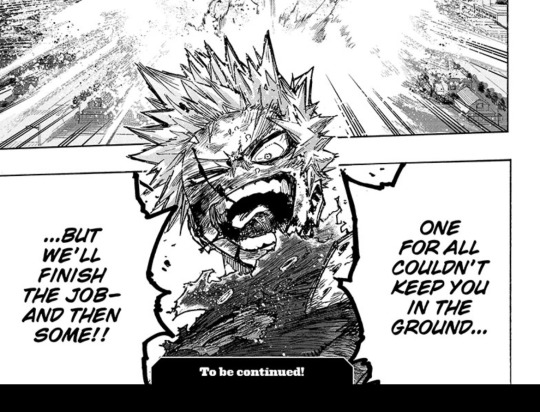
He’s NOT belittling Izuku. He’s making good on his promise to have Izuku’s back.
Here is the literal translation (courtesy of the amazing @pikahlua):
1
OFAに拭えねーもんは
あいつにぬぐえねーもんは
aitsu (kanji: OFA) ni nuguenee mon wa
"What he (read as: One For All) can't handle..."
2
こっちで拭うってなぁああ!!!
こっちでぬぐうってなぁああ!!!
kocchi de nuguu tte naaaa!!!
"I'll handle right here!!!"
And here is the part of the apology scene Katsuki is referencing:
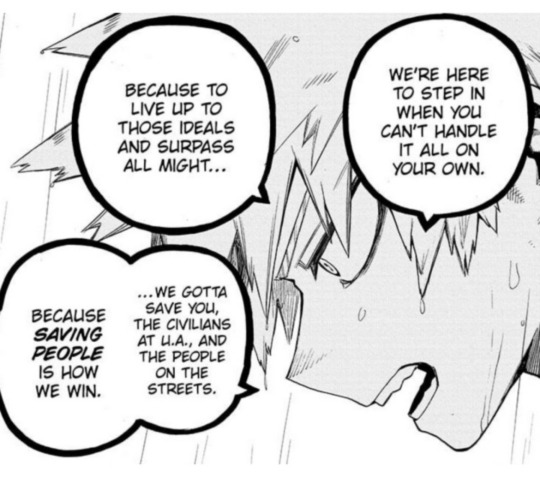
And here is the fan translation:
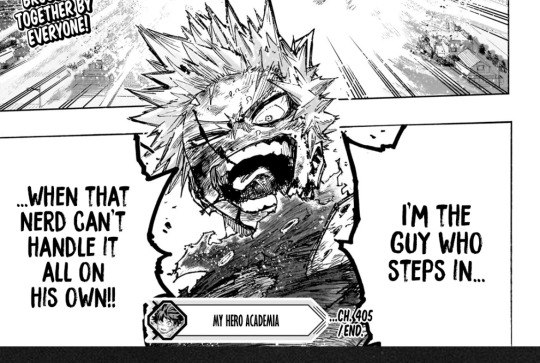
Do you see how Shonen Jump missed the point???
#bkdk#dkbk#bakudeku#dekubaku#mha spoilers#bnha spoilers#meta#mha meta#chapter 405#mha 405#bnha 405#bakugou katsuki#kacchan
1K notes
·
View notes
Text
Izuku isn't losing his arms and here's why:
Okay so I know that we're all freaking out over that one manga panel, but we really shouldn't be.
Deku isn't going to lose his arms. It's all in his head.
Just stay with me.
First and foremost, look at the reactions from the characters when they join the battlefield. Specifically Aizawa:

What about this screams 'one of my students just lost both of his arms and may not end up having a future as a hero anymore?'
You would think that if Hori were to really go through with Izuku losing his arms, he would put more emphasis on the characters' reactions to make it more impactful, right?
To further reinforce this idea, we also need to consider the significance of Izuku's hands in Katsuki's arc. Whether you view their relationship as romantic or not, you can't deny that Izuku's hands holds significance to Katsuki. It represents the time when their relationship first fell apart, and I think in order to call their relationship fully 'healed' and complete Katsuki's growth, he's going to need to accept Izuku's hand again.
I mean, look at how foreshadowed the handhold is. There's no way they're not going to be holding hands by the end of the series. It's a necessity at this point.
And yes, you can argue that they already did hold hands, but to me that handhold didn't seem like the official one. It wasn't as impactful as it could've been. Now, while I'm not saying that the handhold didn't have any emotion to it, I feel like it's impact got a little diluted by Katsuki's revival. It wasn't the main focus. I think that the proper handhold is going to come later and be in it's own moment.
And, I mean, Izuku kind of needs his hands for that to happen.
So now you may be wondering, if Izuku hasn't lost his arms, then how do you explain what's happening to him right now?
Well, like I said earlier, it's all in his head. I think it's AFO fucking around with his mind.
I think AFO is somehow manipulating the vestige world and OFA mental connection he was with Izuku to make him hallucinate that he's lost his arms. He wants Izuku to crumble, and what better way to do that than to convince him that his dream is over and that there's nothing he can do?
I feel like this has also been foreshadowed in a way too. Take a look at this picture:
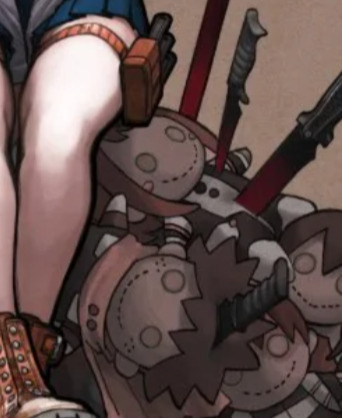
This image already foreshadowed Ochako getting stabbed in the chest, so perhaps it's also foreshadowing Izuku's fate?
The knife is in his head, so perhaps it's hinting at him being affected psychologically?
Also, the idea that it's only those that are connected to the vestige realm that can see the illusions that AFO is planting would be a great way to get Katsuki to be a part of the final fight too.
We already know that's he's going to be involved somehow. Hori himself said that the ending for mha was going to be better than the ending for Hero's Rising (the one Kats and Izu share OFA), and what better way to improve that than have Katsuki come save him from the mind fuckery?
I also think that finally having Izuku and Katsuki fight side by side has been foreshadowed for a long time, and if that really were to happen, then there's no better time for that than the final fight.
Also, Katsuki's really the only one that can save Izuku right now if my theory were to be true. He's the only character that fits the very specific requirements that Izuku needs (being connected to the vestige realm, and also having a willingness to save/help Izuku).
Speaking of, Katsuki being connected to the vestige realm was a shock for us all, and it doesn't make sense for why Horikoshi would show us such ground-breaking information if he didn't plan on using it later. This has to be the later. There's no other case where I can see Katsuki's connection to the vestige realm being implemented into the story again other than this.
So here's the TL;DR:
Izuku is being mindfucked by AFO and Katsuki is going to be the one that brings him back to reality
#bnha#mha#mha theory#bnha theory#mha manga spoilers#bnha manga spoilers#my hero academia#boku no hero academia#bakugou katsuki#katsuki bakugou#izuku midoriya#midoriya izuku#one for all#all for one#mha predictions#bnha meta#mha meta#bkdk#bakudeku
445 notes
·
View notes
Text
Kirishima to Mina:
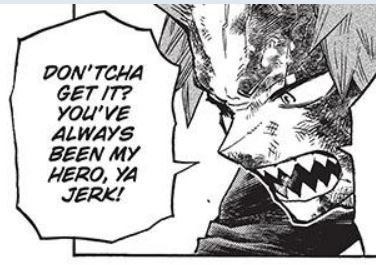
Yoichi to Kudo:
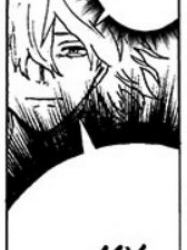
Interesting parallel between two pairs who have a lot in common with our main characters. Something you want to tell us, Horikoshi?
#mha#bnha#bnha spoilers#mha spoilers#bnha 413#mha 413#bkdk#bakudeku#kirimina#kudoichi#bnha meta#mha meta#kinda#this could be used in a meta post about admiration and inspiration that i'm sure plenty of people have already written#i imagine we might get a post-war conversation between them about it
458 notes
·
View notes
Text
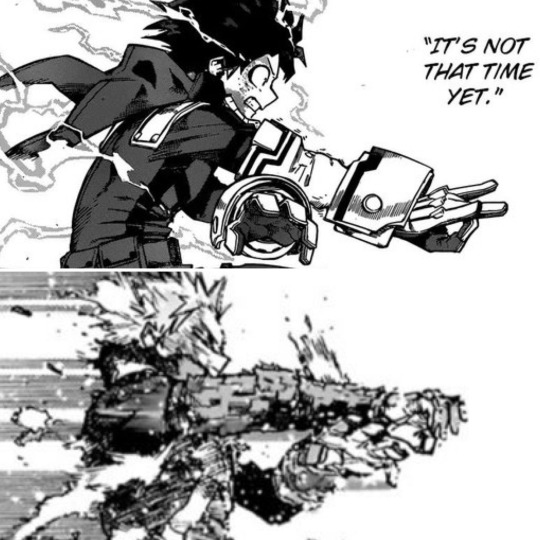
Oh… OH!!!!!
Love all of the details and parallels in Hori’s art! Excited for more BKDK moments ✨🧡💚
#bkdk#wonderduo#katsuki izuku#decchan#mha meta#bakudeku#bkdk soulmates#mha spoilers#mha 409#soulmatebehavior#samemoves#same hearts#ilovethemsomuch
518 notes
·
View notes
Text
Deku's possessiveness V.S. Kacchan's protectiveness
Bkdks. We've all read countless fics with bkdk pining after each other, of them getting jealous and whatnot. Usually, the fandom labels Kacchan as the possessive one and Deku as the protective one, but I (respectfully) disagree. I say that Deku is the possessive one and Kacchan is the protective one.
Now, when I say Deku is possessive and Kacchan is protective, I'm not saying that they don't have the other trait. bkdk are both protective and possessive of each other. HOWEVER, the way I see it is:
Deku is possessive. When he gets possessive, it feeds his protectiveness.
Kacchan is protective. When he gets protective, it feeds his possessiveness.
When you read fics from Deku's POV and he's seeing Kacchan being happy with someone else (both platonic and romantic), he gets possessive. Why not me, why THEM, I know him better, I've known him for LONGER, etc. There also is a kind of "indulging" in the "selfishness" of wanting Kacchan all to himself if that makes sense. Like yes, he'll feel bad about being jealous over Kacchan having friends, but also he can't bring himself to stop being jealous/possessive of Kacchan. Deku's possessiveness has the message of "I know Kacchan better than anyone else ever has/will, I've worked hard to stay by his side and I'm not gonna let some EXTRA take him from me."
However, when you read fics from KACCHAN'S POV, and he's seeing Deku being happy with someone else, he gets protective. He also kind of attacks himself in the sense of "I want the best for Deku and I am not the best. I hurt Deku countless times in countless ways, [person] hasn't hurt Deku like I have, and [they] will make Deku happier than I ever could. If they ever hurt him though [they]'re dead." Kacchan's protectiveness has the message of "I want Deku to always be happy. If he's happy with someone else, then I'm happy."
Again, Deku does have moments where his protectiveness shows more than his possessiveness. A prime example is the training camp arc, when Kacchan is kidnapped. It starts as possessive, with Deku basically going "Give my Kacchan back!" and Compress commenting on this and saying that Bakugo doesn't belong to anyone.
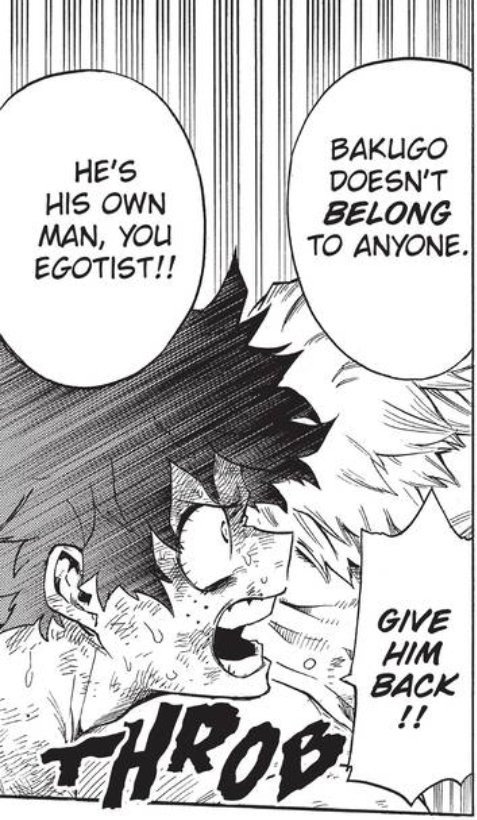
However, as his possessiveness increases, Deku's protectiveness also increases. He's a lot more self-sacrificial and desperate in reaching Kacchan to save him. To protect him.
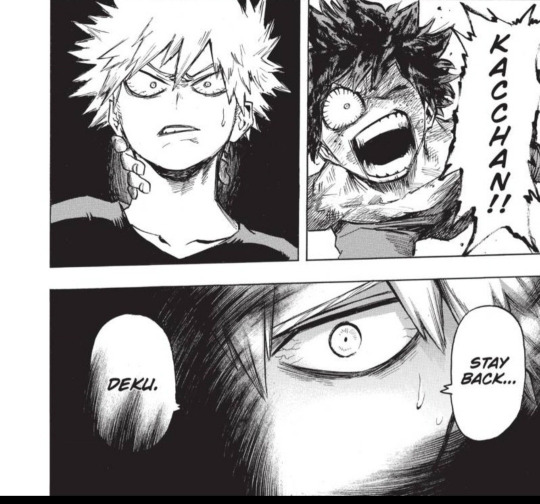
On the other hand, Kacchan also has moments where his protectiveness gives way to more possessiveness than usual. The first example is when Kacchan is stabbed by Shigaraki. He sees Deku about to get severely injured, and he becomes protective and takes the hit instead of Deku. However, after getting stabbed, he says "stop trying to win this on your own." This is where his possessiveness shows, in which he's trying to fill the role of being a Symbol of Victory. "Let me be YOUR Symbol of Victory."
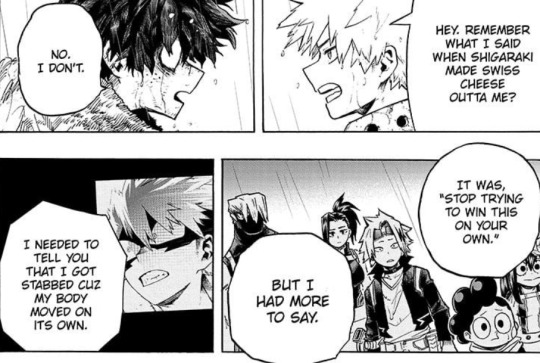
There's also the fact that Bakugo carries guilt because of his actions from the past. This has him being more prone to leaning away from being as possessive as Deku is because "I hurt Deku. I don't deserve him. Deku isn't mine. He doesn't belong to me, he never has." Because of this he leans more towards protectiveness in the sense of wishing for him to be always happy in the ways that he prevented when they were younger and whatnot.
Of course, during his apology, he also expresses how they all will help him. However, you also have the moment where Izuku stumbles and falls. Kacchan's protectiveness comes in as he rushes to grab him and hold him steady. Izuku apologizes for the things he says, and Kacchan says "I get it." Not we, because his possessiveness comes forth in that moment. It also comes forward when he talks to Class 1A and Endeavor.
"You know nothing about Deku."
"I know Deku more than anyone else."
Those are very possessive statements, which are very similar to Deku's possessive mentality.
However, Deku doesn't carry guilt. This has him lean more towards being possessive of Kacchan. "I've ALWAYS stuck by Kacchan, you must be stupid if you think YOU can take him from ME."
However, I also think that once bkdk enter a relationship and Kacchan truly, wholly believes that he is worthy of Deku's love and the relationship in general, he'll allow himself to be a lot more possessive. Like once he's had the realization of "Izuku deserves the best and he chose ME, and I trust his judgement so that means I'm the best for him," he'll go, "Anyone who tries taking him from me will lose a couple fingers. I bite bitch," which is how I feel a lot of people think he's like from the get-go, when that more blatant possessive comes later on.
Again, it all circles back to the good old "bkdk are two halves of a whole, they complete each other."
Win to save, save to win.
Victory and peace.
Protectiveness and possessiveness.
Anyways.
Thank you for coming to my Ted Talk, bkdk is canon I will kill AND die on that hill and I do not take criticism. Have a great day.
#bkdk#bakudeku#dkbk#dekubaku#mha meta#bnha meta#mha#bnha#my hero academia#boku no hero academia#katsuki bakugo#izuku midoriya#bkdk meta#bakudeku meta#dkbk meta#dekubaku meta#deku#kacchan#bakugo x deku#bakugo x midoriya#katsuki x izuku#katsuki x deku#kacchan x deku#kacchan x izuku#zay's crackpot rants#bkdk character study#my very first long post for bkdk oop#or mha in general lmao#this was fun#mizismiz
1K notes
·
View notes
Text
I really like how important friendships are in MHA, especially as an asexual person. And like - you can romantically ship whoever you want, I have my own headcanons about romantic ships that aren’t canonically romantic. But when looking at the canon, it’s nice to see how important platonic friendships are.
The league of villains are a found family.
Katsuki and Izuku are childhood friends (to enemies to friends) who mean the absolute world to each other.
Rooftop trio and the Pussycats are so close with their friendship groups that they made/planned to make their hero agencies together.
All of Class 1-A have a tight-knit bond.
The Bakusquad and the Dekusquad exist.
Ochaco, Izuku and Tenya became really good friends really quickly.
Having friends saved Shoto.
Aizawa and All Might go from being work colleagues to bring friends, and this makes a huge impact on All Might’s life.
Like Idk, I know the fandom tends to focus a lot on the shipping aspects, but I would love to appreciate the friendship more, because it’s so important to the characters, and, as an aroace person, it’s really important to me too.
#league of villains#bakusquad#dekusquad#rooftop trio#my hero academia#boku no hero acedamia#bnha#mha#lov#all might#class 1a#mha meta#wild wild pussycats#bnha meta
349 notes
·
View notes
Text
I posted this image last night from MHA 412 — with Izuku down on the ground, literally in All Might’s shadow — and HAD to talk about it more. See, Izuku is remembering himself in All Might’s shadow, but that’s not how the scene actually looked. Izuku is the one imagining that shadow. Nobody is thinking or expecting him to be All Might 2.0 except himself.

Way back in Chapter 97, All Might thinks how Izuku WAS walking in his shadow, but isn’t any longer. And that fact excites him — by the time we get to Kamino, All Might doesn’t WANT Izuku in his shadow. However, All Might doesn’t tell this to Izuku.
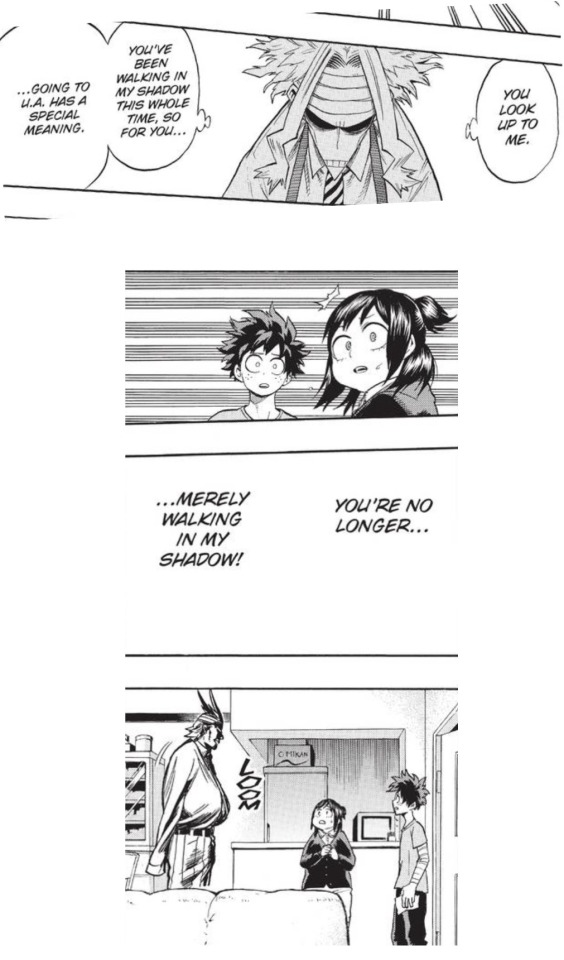
When Izuku offers OFA to Mirio, All Might doesn’t interrupt OR say anything to Izuku afterwards. He won’t demand that Izuku be like him or keep OFA. (Also notice Mirio saying Izuku would be sad without his quirk.)
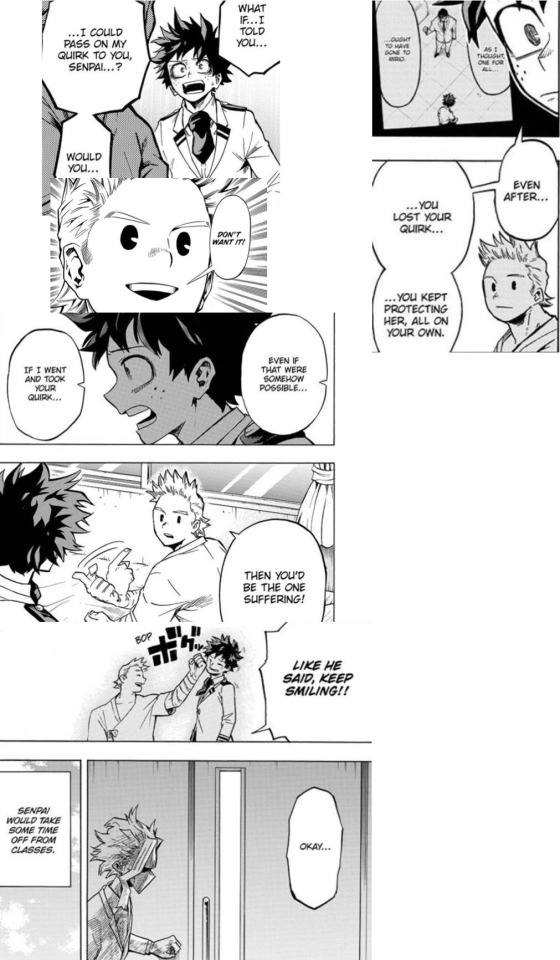
All Might is proud when Izuku learns parallel processing from Endeavor and masters Blackwhip, something All Might never had to contend with and that is unique to Izuku. (Also notice the flashback to All Might saying Izuku earned OFA by being heroic.)

But Izuku doesn’t know any of this. What about when All Might DOES talk to Izuku? WELL IT DOESN’T MATTER BECAUSE IZUKU DOESN’T UNDERSTAND! Going back to the ultimate moves lesson, All Might advises Izuku that he’s stuck trying to emulate All Might (which is the same thing Gran Torino told him before). But our big-brained chosen one MC [affectionate] STILL STRUGGLED FIGURING OUT WHAT ALL MIGHT MEANT. It was genuinely hard for Izuku to grasp All Might’s intent.
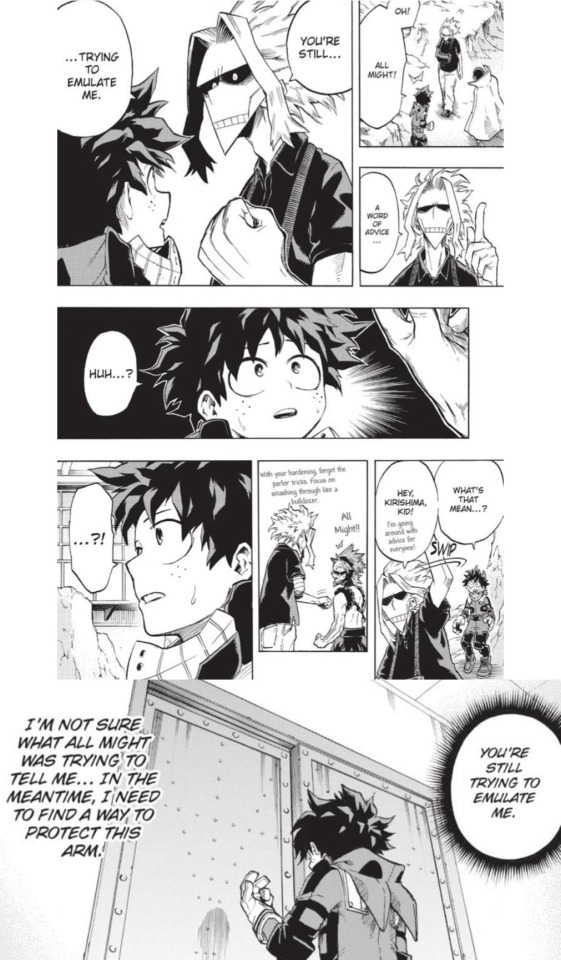
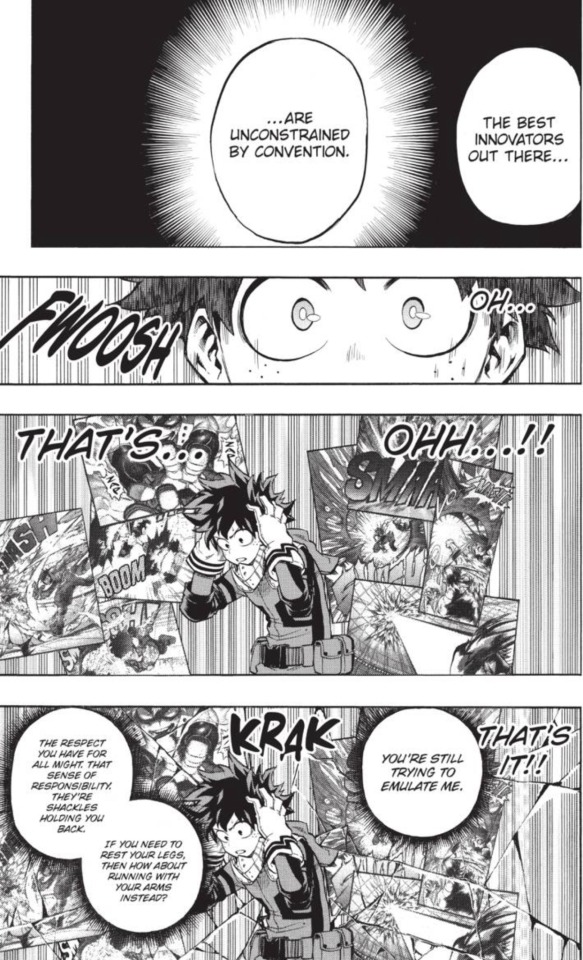
You’d think this moment would give Izuku a clue, but no. Izuku’s moves continue to be derived from All Might, and he continues to think he’s “not just copying.” It culminates in the Dark Deku/Villain Hunt arc with Bakugo calling Izuku an All Might wannabe, and Izuku telling 1A that they can’t join his fight because they can’t keep up with the likes of him, Nana, All Might, and Shigaraki. Since then, Izuku has promised not to do things on his own, but we haven’t gotten an update on the idolization front.
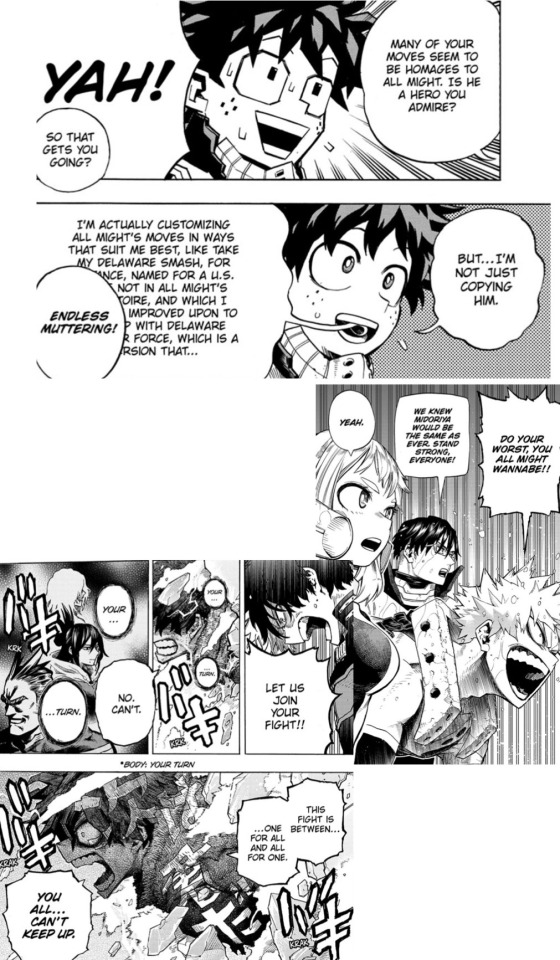
Izuku’s idolization and imitation of All Might remains strong even after hearing it directly from Gran Torino and All Might and Bakugo and 1A. It’s obvious to everyone, including All Might, but it’s just … not … to Izuku. What’s truly hilarious is that Izuku will talk back to the vestiges — he mouths off to Second and Fourth, and he withstands Nana’s challenge to kill her grandson (twice as of 412!!). Izuku also challenges Tomura, and even All for One. But not All Might.
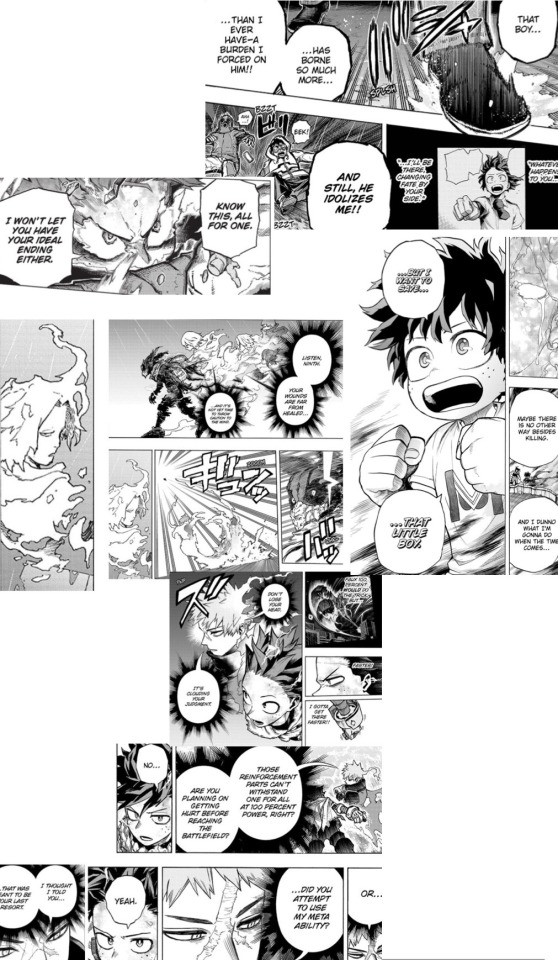
After everything, Izuku STILL envisions himself in All Might’s shadow from the moment All Might said he could be a hero and offered OFA to him. For all his status and his “triumphs,” Izuku sees himself as a nerd who needs a quirk — who would be sad without a quirk just like Mirio was — and THAT is what Izuku has yet to overcome. Izuku has never heard anyone tell him very bluntly and directly that he CAN be a hero without a quirk. (And that kind of blunt communication is exactly what he needs because, well, he’s a little slow to change his self-perception. Remember when Toga said she liked him?)
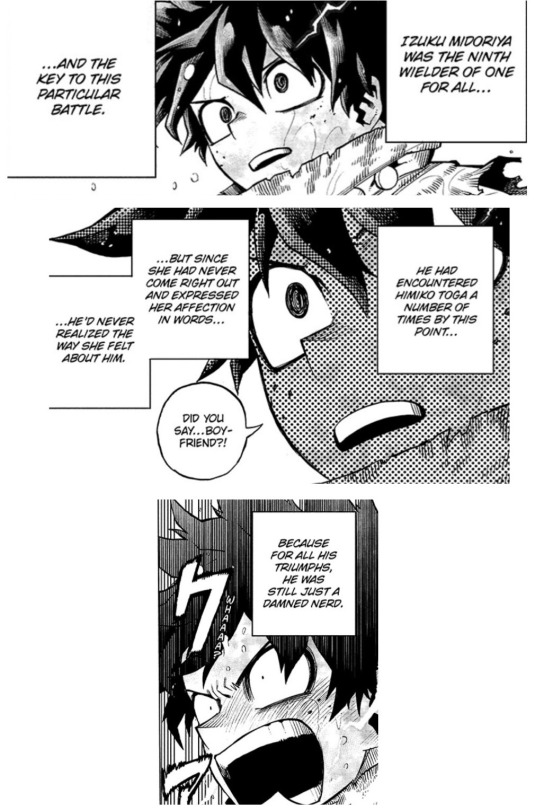
Even though Izuku has seen quirkless Mirio protect Eri…and watched Iron Might and practically quirkless Aizawa fighting…and he knows quirkless Ragdoll helped with planning, and La Brava is playing her role as a computer expert (unrelated to her quirk)…Izuku is going to need to hear, plainly and bluntly, that he IS a hero without OFA. He’s BEEN a hero. He earned OFA “fair and square” in the first place BECAUSE he was a hero. If All Might was a madman for fighting quirkless and being willing to sacrifice his life to live his dream, then Izuku will have to be the craziest hero ever to put his quirk, his life, AND his dream on the line. I’m hoping we get some blunt verbal Izuku appreciation from All Might, Bakugo, 1A, and others so Izuku KNOWS, once and for all (ha!) he is a beloved friend and hero without One For All. Then he can go on to save Tomura (and the world).

#mha 412#bnha 412#bnha spoilers#mha spoilers#izuku midoriya#Deku#toshinori yagi#all might#one for all#ofa vestiges#mha meta#bnha meta#my hero academia#boku no hero academia
256 notes
·
View notes
Text
I will probably write a whole essay about this later but,,
The fact AFO is attacking Bakugou with the language Bakugou would use to demean people. The way that the downfall of AFO would be the very attributes that Bakugou had to relinquish in order to beat him. The way that he is not only fighting the big bad but is also fighting his past. The way he is again sacrificing his everything to win and for Midoriya. The way he is hearing that he is an extra, that he is a nobody, all of the things he has told everyone else, and has not only accepted it but is embracing it: He is here to support Midoriya, he is the one who needs to get out of Midoriya's way, he is not the main character of this story. And he has wholeheartedly embraced that.
He has not only taken the hand of others and realized he can't do it alone but has found the strength in doing so.
He has learned that the world doesn't revolve around him. He has learned that he needs to know when to get out of someone's way.
But not for AFO. Bakugou will still never back down from a fight. He still will go down swinging. He will not move out of the way when it comes to an enemy.
But he has realized Midoriya isn't an enemy. Izuku never was.
#this is a bit messy because i have so many thoughts but i had to get it all out there#bakudeku#<- i mean at this point its all implied#bnha 409#mha 409#mha spoilers#bnha spoilers#im going just a lil insane#just a lil loopy#just a lil silly crazy#i will probably write an indepth essay later#bnha meta#mha meta
212 notes
·
View notes
Text
we don't want izuku to be quirkless in the end blah blah blah, yeah i know. same.... but also, it could be cool.
imagine he still becomes a great hero, but quirkless? he's the first quirkless hero? and maybe that message is not one for mha to tackle, but hear me out:
what if his arc is him wanting so badly to have a quirk, getting one, learning that being a hero is inherent to himself and not attached to his quirk/abilities, giving his quirk up, AND still being a great hero? wouldn't that be awesome?!
i think that type of character trajectory is unique and interesting in and of itself. but i also know my personal experiences in life contribute to why i think it's cool. i became sick and chronically ill in my late-teens/early-twenties. i lost my health. over the past 5 years, i've regained a lot of it, but i'm not 100% better (and most likely will never be). i've had to go through the arduous process of accepting my physical limits through many iterations of functionality yet learning when i was actually being held back by mental limits/fears and how to push past those.
i relate to izuku's character on many levels: wanting so badly to have something i don't, trying so hard despite not having that thing, and getting that thing you wished so badly for seemingly out of the blue (for me, it was a medication that drastically improved my health). i also relate to his self-destructiveness in name of a goal and sense of (sometimes unwanted) martyrdom.
but i was always a little disappointed throughout the series in the fact that izuku's big problem at the beginning was just seemingly resolved by him getting his quirk from all might. does he view his quirkless self as worthy as his OFA self? we don't know. (do i view my sick self as worthy as my "healthy" self? i don't know.)
so, i just think, if izuku loses his quirk, there is more room for growth for him. in other words, he becomes more interesting. and i get it, this is a shonen manga, it's ending soon, and it's supposed to have an inspiring message (i assume). so maybe it ending with him being quirkless is not something that belongs in this category of manga/anime. but if any series can break the mold, isn't it mha?
#i also wanted to add something about how the legend of korra did a good job with disability rep when she lost her bending and had ptsd#but i didn't know where to put that#so here we are in the tags#anyway#and i just think izuku could be a metaphor for that with losing ofa#mha#my hero academia#bnha#boku no hero academia#izuku#izuku midoriya#deku#mha spoilers#mha manga spoilers#bnha spoilers#bnha manga spoilers#quirkless izuku#quirkless deku#midoriya izuku#mha meta#bnha meta
117 notes
·
View notes
Text
I was thinking about how much the LoV lost during the Paranormal Liberation War. Besides Twice dying, Compress sacrificing himself, losing their base and their army; they also lost their home. Possibly the only sense of domesticity any of them ever had.
The League had been on the run, squatting in abandoned apartments or warehouses for months before merging with the Meta Liberation Army. Touya has been homeless since he was sixteen. Him, Tenko, and Toga all grew up in abusive homes. Jin had been lonely and struggling to get by financially for most of his life. Spinner was a recluse who didn't leave his house much due to all the discrimination he faced in his hometown. None of them (besides maybe Compress?) had a decent home life.
But, after they win against the MLA, for the first time, they have a consistent place to stay, their own rooms, with access to decent food, and a level of control over their environment they didn't have growing up. They were even leaders over different units in the PLF. This was probably when they were all at their happiest, or at least most content. Even if they didn't have Shigaraki around, they still had each other. And sure, Touya still had a death wish, but he wasn't planning on going after Shoto or his father for a while. They felt safe, for possibly the first time in their lives. And they only get about 3-4 months of that before it all falls apart again.
I wish we got to see more of that time, what their daily life was like, the shenanigans Twice and Toga might have dragged the rest of them into, if Spinner got any of them to play games with him since Shigaraki was out of commission, etc. I imagine they all had rooms on the same floor, and would all kind of hang out during their down time like they were already doing when they were on the run. Maybe someday we'll get lucky and they'll do a LoV focused light novel or Team-Up Missions volume.
But hopefully, they all get to experience that sense of peace, of home, again once the war is over. They deserve it.
#my hero academia#dabi#touya todoroki#league of villains#toga himiko#shigaraki tomura#spinner#shuichi iguchi#mr compress#Twice#jin bubaigawara#mha meta#bnha meta
199 notes
·
View notes
Text
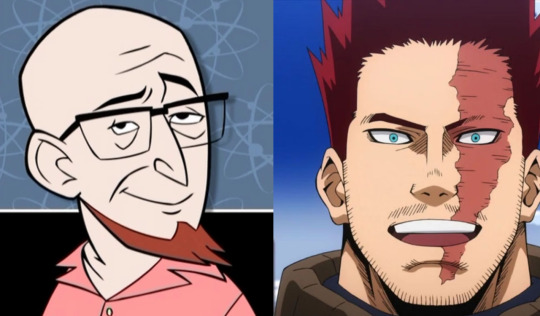
Dr. Venture vs. Enji Todoroki: How to Write Bad Dads
This is a post comparing two shows about two abusive dads who are the main characters instead of their children. My Hero Academia is a Shonen jump manga that takes inspiration from American comics and shonen manga. Whereas The Venture Bros is an adult swim cartoon that started out as a parody of Johnny Quest, and grew into a seven season long character study of former child star Rusty Venture.
The idea for this post came from the fact that I've noticed a common hot take from MHA fans that Endeavor's redemption arc is bad because it's wrong to make an abuser the main character.
I've always disagreed, and used The Venture Bros as an example of a show where making an abuser the main character works. Rusty is actually a well-liked character in the venture bros fandom. So my question is if these characters are both abusers why is one of them generally accepted and the other one so controversial?
Before we begin I want to say this is a story with fictional characters. Don't bring real life into the equation. We are doing literary criticism here and only talking about the events that happen in the story.
Anyway, My Hero Academia and The Venture Bros seem like the weirdest shows to compare but they are actually pretty similar. They are both comic book shows that are commentating on the comics they're inspired from.
What My Hero Academia is to Spiderman and Dragonball Z, Venture Bros is to Tom Swift Novels, the Hardy Boys, and old Hanna-Barbera Cartoons. They also make the decision to focus on the characters as people rather than heroes. They are telling the stories of real people that exist in a world overflowing with both heroes and villains.
1. Meet the Venture Brothers

If you've heard of the Venture Bros then you've probably heard of the premise that it's an adult parody of Johnny Quest. Johnny Quest for those of you who have a life and therefore haven't seen every old Hanna-Barbera Cartoon like I have is a show where eleven year old Johnny Quest travels around the world with his super scientist father Dr. Benton C. Quest and their bodyguard Race Bannon, going on adventures in Jungle Ruins or fighting villains.
In the Venture Bros the main character Dr. Thaddeus Venture is an emotionally abusive and neglectful father who constantly exposes his sons to danger in his trips around the world. Their bodyguard Brock Samson is a ultra violent and is basically a thirteen year old's idea of what a cool manly man is. The titular Venture Bros, Hank and Dean Venture are sheltered children who are constantly being chased around by men in costumes trying to kill them.
So the basic premise of the show lies in it's dark deconstruction of shows like Hardy Boys, Johnny Quest, these Tom Swift-esque stories where young boys go on adventures by showing the real dangers that children would be exposed to in that kind of life.
Between Johnny Quest, the Hardy Boys, and Tom Swift, what is up with these pie-eyed youths chasing pirates and international diamond thieves and stuff like that? They would get their throats cut the minute that stumbled upon a hideout. And that would be the gag. - ART AND MAKING OF THE VENTURE BROS.
The show does explore Hank and Dean's trauma, but despite the title of the show they are not the main characters. The protagonist is Doctor Thaddeus Venture who himself is other victim of the Boy Adventuring Lifestyle.
Dr. Venture: "Who was, for 43 years, the only son of Dr. Jonas Venture? Who, from the ages of 3 to 17 accompanied him on hundreds of adventures the chilling memories of which rouse him from sleep in a cold sweat to this day?"
Thaddeus used to travel around the world with his father the super scientist Dr. Jonas Venture who was a far more successful super scientist and hero. He's the former star of the "Rusty Venture Show" a cartoon based off of his travels with his father.
Jonas who continually neglected and gaslit him throughout his childhood to the point of not allowing him to go to therapy. He gaslit him so hard there's a scene where he literally pretends to be Rusty's therapist to tell his son to stop complaining.
Rusty: "So I don't know. Sometimes I wish I could just be a normal kid and go out and play with kids my own age and stuff. The only people I get to hang out with are grown ups. The only time I get to leave the compound is to go someplace creepy, like the Bermuda triangle, and then I get kidnapped, by grown ups. And I'm not even sure I want to be a super scientist when I grow up anyway, but I feel all this pressure because of my fa-It feels weird telling you this stuff."
Jonas: "Remember Rusty, in here I'm your doctor not your father. Now let's get back to it shall we. You were telling me how you're ungrateful for all the opportunities your father's given you and you blame me for all your problems."
Rusty is both a washed up child star, and a faiilure to his father's legacy. He never formed an identity outside of being the star of the Rusty Venture show or the son of Jonas Venture. He drags his kids all around the world on crazy super science adventures because that's what he knows.
The central premise of the Venture Bros is that Rusty is basically stuck and cannot meaningfully grow up into an adult and his own person, despite the fact he is now a single father trying to raise two sons. The central theme is about three generations of one family, and what it says about the complicated nature of family itself,
As Rusty is both the victim and the perpetrator of the abuse it makes sense he is the main character the story centers around because he's the central link between Jonas and the Twins.
The themes can be summarized in one line said towards the end of the show:
BEN "Just a watch. Tells the time in two time zones. That fourth hand there? Little date window? Those are called complications. Complications make a watch special. More complications the more value. Read the engraving Jonas put on the back there. Elige Tua. It's Latin for Choose your family. Blood doesn't make a family, love does. Choose your family and remember that complications make it special."
In other words it's a seven season long show on how family is complicated.
2. Keeping up with the Todorokis
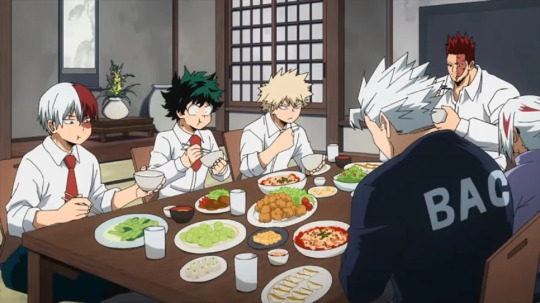
My Hero Academia is about a lot of things, but the central premise is that in a society where he quirk you were born with can determine a lot about your life, one boy without a quirk sets out to prove that anyone can be a hero.
If Complciations make it special is the central theme of Venture Bros, then the central theme of My Hero Academia is two sentences. "All People are not created equal" and "Anyone can become someone's hero" both said at different points in the story. The story itself is about Deku's attempts to overcome the first statement, that he was not born equal but he deserves to be a hero as much as anyone else because he represents the true spirit of heroes. That heroes don't just show up to beat the big bad, a hero saves people.
The story isn't just about Deku though. We're not even going to talk about Deku in this post, but rather the Tritagonist Todoroki Shoto.
Todrooki is introduced as a foil to Deku someone who is born with an extremely powerful quirk, but who's been groomed from childhood to be a hero.
Shoto's father Enji Todoroki is All Might's ultimate rival. In the world of MHA hers are highly commercialized and ranked by popularity and achievements and Enji has been number two his entire life. He decided to conceive of an heir that could surpass All Might instead.
He purchased a wife with an ice quirk for an arranged marriage to selectively breed for a child with a fire and ice quirk. When Shoto was born he raised Shoto up as a hero, forcing him through grueling training sessions from a young age, and beating his wife when she tried to intervene for Shoto's sake.
That's a lot and I didn't even cover all of it. After this reveal of Shoto's backstory, Enji seems like he's only going to be a one note abuser to give Shoto a tragic backstory to angst over.
However, later on in the show Enji ifinally becomes the number one hero only to realize how empty his lifelong dream has been. He feels remorse for the family he destroyed in pursuit of that dream and starts wanting to make ammends. After this , Enji basically becomes the second most important character of the "Todoroki Family" arc. . A lot of focus is put on Enji's attempts at atonement to the point where some accuse him of stealing the spotlight from his victims.
These two families have a lot in common. They are basically families who are not allowed to have normal lives because the patriarch of the family is a costumed hero. The hero is also someone who is generally well-respected and is considered extremely successful in their chosen career, but are terrible to their family members. They are a hero to the world and a villain to their own family.
If there is a central premise to the Todoroki Family outside of MHA's analysis of what exactly makes a hero, it's this:
Todoroki Shoto: "As a hero this endeavor guy is pretty darn amazing. But it's just like Nasu said. I'm not ready to forgive you... for abusing mom. So, heroics aside. What sort of dad are you going to be? That's what I want to find out?"
The challenge is if Endeavor can choose his family over being a hero.
You can se the parallels in Venture Bros, as Rusty's main struggle is to try to be a father to his twin sons and help them grow up while at the same time struggling in this dangerous worlds of super science. Rusty is a super scientist constantly getting chased around by guys in costumes, but he's also a normal father trying to raise two sons into adulthood with basically no idea what he's doing because he doesn't have a frame of reference for how fathers are supposed to act or what a normal childhood would even look like.
The comic book super scientist, and the comic book hero are expected to act like real fathers to their sons.
However, as I said above in Rusty's case it's pretty uncontroversial that he is the main character of his story, whereas Enji starts fights within the fandom very time he appears onscreen.
Why is this exactly?
It's not because it's offensive to have an abuser be the main character, but rather how these characters are written and how well they fit into their stories. As I said Rusty is naturally the main character of his story because he's the central link in the chain of abuse, but should Enji be the main character of the Todorokis? Does he fit as well as Rusty?
3. Who's your Daddy?
So as stated above Enji and Rusty simultaneously exist in worlds where heroes exist and yet they are also normal people who are expected to provide for their families and raise their kids. They both exist in what is basically the marvel universe, though in the case of Venture Bros it's the Marvel Universe fused with old Hanna-Barbera cartoons.
Because of this world some of the things both Enji and Rusty do are things that have no real life parallels. For example Rusty once created a machine using the soul of a dead orphan as a power supply. You can't do that in real life so I'm not going to use that as an example.
Both of these stories are drawing on real life parallels of parental abuse I'm going to be talking about those to tell what kind of neglectful parent each is.
Rusty raised Hank and Dean Venture as a single parent with the assistance of their body guard Brock Samson. They live on the Venture Compound and only leave when Rusty needs to take a trip around the world. Obviously, there's not many real life examples of parents taking their kids into egypt to fight mummies.
However, Rusty's main flaw as a parent is how much he shelters his children not allowing them to make their own choices. They are homeschooled until they are eighteen and almost never allowed to leave their home unsupervised. Rusty could be compared to a helicopter parent that feels the need to micromanage every aspect of their child's lives, sheltering them so much they're unprepared for the real world.
Rusty is a weird combination of controlling and neglectful, because while he doesn't let either of his childre go to public school aor interact with kids their own age, he constantly exposes them to danger. He is often disinterested in his kid's lives and puts most of the burden of protecting them and raising them on his bodyguard Brock, while he chases after whatever super-science project is occupying him at the moment. He's neglectful to dangerous extents too considering they're always getting cahsed around by crazy men in costumes.
Also, he lets them die a lot.
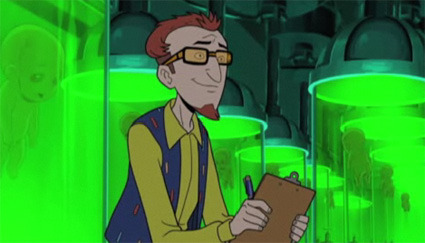
Hank and Dean have died several times over, only to be replaced by clones that Rusty grew in a lab with all the same memories. Once again there's no real life parallel to this, but it's interesting in the context of the show itself.
How do these children survive being chased by villains and constantly kidnapped? The answer is, they don't.
They die, and then Rusty just clones a new pair of boys. That in itself should make Rusty irredeemable but the show presents it in a more ambiguous light.
Dean: "You're telling me I'm a clone, that I'm not even Dean, that I'm some stupid science experiment."
Ben: "No, no, no. You're Dean. There's no other Dean, you're it, flesh and blood. Look I was conceived in the back seat of a packard, you were conceived in a tank. So what?"
Dean: "So I have no mommy? No nothing!?"
Ben: "Dean, you have it all wrong. You have a mommy, and your dad is your dad. They made you by getting drunk and forgetting to wear a condem like everybody else, and your dad loved you so much that when you got a boo-boo, he kissed it and made it all better and made it go away."
Dean: "You brought me back to life."
Ben: "Yeah okay, well you and your brother had some pretty big boo boos. Have a kid one day, Dean. Hold it's lifeless body in your arms, and then tell me how wrong it is. Jonas, me, and yes your dad, saw it as nothing more than a fucking band-aid for a really big boo boo."
In the story itself it brings up the argument that if any parent was holding their dying child in their arms they'd want to bring them back somehow. That in the logic of the show it's the same as using magic to revive someone from the dead. At the same time it's not because Rusty's let his sons die multiple times and never changed his lifestyle because he can just keep replacing them with clones.
Super-science aside, it is kind of a metaphor for Rusty's parenting as a whole that his sons have been cloned and replaced so many times they're perpetually sixteen and never allowed to grow up. Rusty's so neglectful he's never taken an interest in raising them and this is the result, they literally do not grow up.
It's also probably relevant to mention that Rusty himself is a clone and died and was replaced multiple times much like his sons, and the technology for cloning Hank and Dean was invented by his father Jonas.
However, after season 3 the cloning lab gets destroyed, and the body guard Brock leaves the family. With the safety net removed Rusty actually starts taking a more active role in both of his child's lives. This is basically a mirror to Endeavor's moment of realization after getting number one hero that his entire family has grown up without him and they all resent him.
Season four onwards Hank and Dean develop into their own people outside of Rusty. He responds to them in different ways but he's actually parenting them this time instead of shoving them away like annoyances. Hank becomes rebellious and fights back against Rusty for a long time after Brock leaves because he no longer has a role model and Rusty's response is to always get strict and punish him.
Whereas when Dean rebels not only does Rusty tolerate it, he also spends a lot more time in Dean's life trying to push him into the direction of being a super-scientist like him, supporting his efforts to go to college, while basically ignoring Hank. It's a running gag in the show that Dean is obviously Rusty's favorite, but even when playing favorites Rusty by this point in the show has reasons for why he's making those parenting choices.
Rusty: "Dean believes in this crap! He should have been Rusty Venture, Boy adventurer. Hank got this life thrown at him. And he fights against it. Just like I did."
Rusty playing favorites comes from an attempt to overcorrect for both children. He rejects Hank because he believes Hank doesn't want to be a boy adventure and therefore pushing Hank away from his family and the Venture lifestyle is what he needs. Whereas, he believes that Dean embraces the super scientist lifestyle and he tries to mentor Dean into another scientist like himself therefore he gives Dean most of his attention because he thinks Dean needs that guidance from him.
Of course, Rusty is totally wrong about his sons. If anything Hank is the one who wants to be an adventurer whereas Dean just wants a normal life away from his crazy family but parents often misunderstand their children. He's not actively malicious, he's just misguided in what he thinks is best for each of his sons. He's not really even playing favorites in this case he's choosing to parent his sons differently based on what he thinks is best for each of them, it's just in this case father doesn't know best.
Rusty isn't a stagnant character, but also there's no big redemption arc for him the way there is Endeavor. Rusty never narrates about how he needs to atone for his past mistakes. The result is Rusty is a far more amoral character than Endeavor because he's not trying to atone but the narrative also isn't trying to spin Rusty in any way. It's just showing you Rusty as he is, and with all the bad things he does he's still capable of loving his sons.
The question isn't really "Is Rusty redeemable?" but "When is Rusty gonna grow up?"
Then there's Endeavor (everyone starts booing) who is simultaneously a much better, and far worse person than Rusty.
Enji is honestly more comparable to Jonas, an incredibly successful hero who built a career and an empire in heroics and fame and then tried to force his son into that same lifestyle.He's the exploration of that same idea a supposedly great man with skeletons in his closet. Enji technically has saved thousands of people (such as Hawks one of the other main characters). A person who is so good at playing the role of a hero no one would ever expect there are skeletons in his closet.
"Rusty's father was more successful than you could ever imagine. Jonas Venture Sr. was a manipulative narcissist admired by the world for his scientific accomplishements and his hyper-masculine James Bond meets Doc Savage public persona. He's a geniuine villain who was able to take everything he wanted from the world by seamlessly fitting into the role of everyone's hero." [Source]
Jonas is like showing everything nasty about using someone like James Bond as a male power fantasy. He treats women like objects, he thinks he's aboe good and evil, he's effortlessly charming and suave and uses that to get what he wants out of people. Enji similiarly is everything that is wrong with the ideals of hero society. A society that glorifies flashy, strong quirks that are the best for taking down villains. The only person who even seems to care that he's number two is Enji himself, beause Enji is otherwise rich and succesful, a pillar of the hero community, and allowed to get away with a lot because of his position and influence.
Enji is at least a better hero than Rusty, because Rusty is an incompetent mad scientist who does stuff like mutate college interns into four armed freaks and build death rays.
However, as a parent strip away his status as a hero and Enji is little more than a show parent, pushing his children into a life they don't want in an attempt to live vicariously through them. Once again, resembling Jonas more than he really does Rusty. As Jonas forced Rusty to be a boy adventurer, and then made a cartoon out of it to make money like any show parent.
It's also the idea that generation put that kids into films and it was a very horrible selfish thing to do, they were doing trying to live out their own lives through their kids. That didn't exist before that was something that boomers brought to the world. "Oh I can't be these fun new things I'll make you be it." I think Jonas was a pioneer of throwing his kid at the world. I think Jonas was something of a boy adventurer himself, and made his kid be it. But also put his kid on TV to cash in the residuals.
Jackson Publick, DVD Commentary
As stated above Enji gave up on his ambition to be the number one hero and so he decided to create a son with the right quirk to surpass All Might. He then pressured a woman into an arranged marriage, basically purchasing her from her parents and conceived four children until he got his designer baby.
Chapters 301-302 the wrong way to put out a fire, detail the slow descent of the Todoroki Household from Enji entering an arranged marriage with bad intention to create an ideal child to be heir to his legacy, into a full on child abuser. Enji is written like a normal person falling into a cycle of abuse, he never intended to hurt his children at first. Abusers aren't evil monsters, they're just people. Most abusers don't even think of themselves as abusers.
In fact he's shown positively bonding with his first born son who seems eager to learn to use his fire based quirk. He even mentions that he was alright at the time with the idea of Toya being the one to succeed him and letting go of his quirk experiment.
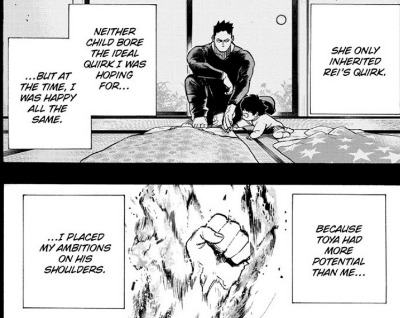
Enji only had kids to carry on his legacy, and only bonded with Toya because Toya was eager to participate in the training and become his heir. However, to give Enji some backstory it's quite clear the death of Enji's own father at a young age left him with no idea on how a father should act.

At a young age Enji witnessed his father attempt to save an innocent girl only to end up a burnt up corpse, and probably at that point conflated strength with being a good father. If his father had been strong enough he would have survived and continued to be a father to young Enji. At that point it's almost understandable that Enji thinks in his mind that earning his keep as the patriarch of the family, and being a powerful hero who will come home alive is the same thing as being a good father.
So Enji conflates masculine ideals of strength and heroism with being a good father, all the while not actually showing up to parent his kids. When Toya seemed like he could live up to Enji's expectations and be strong as a successor everything seemed fine.
However, Toya turned out to be disabled at which point everything in the household began to spiral out of control. After learning Toya could not use his quirk without burning himself, Enji tossed Toya aside and left raising him entirely up to Rei and then pressured her to have more children until one with his ideal quirk would be born.
Toya did not like his father ignoring him and began acting out for his attention. The response of everyone in the household was to politely tell Toya to shut up, because Enji while not being a parent is the money maker and authority in the household no one can stand up to him. When Toya's acting up got too out of hand, Enji would even hit Rei instead of just personally dealing with his son.
At the same time Shoto was finally born and being given his perfect heir after four attempts, Enji eagerly began training him. When Shoto resisted him, Enji stepped up to threats of physical violence and long grueling training sessions to force him to learn. All the while Toya continued to mentally spiral.
One day after his flames turned blue Toya asked his father to meet with him on Sekoto Peak. However that day Enji didn't show up, and Toya lost control of his flames starting a massive forest fire that killed him. Rather than changing anything after his firstborn's death, he doubled down and pushed Shoto even harder.
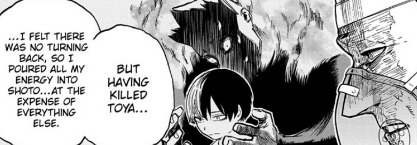
While being a far worse person, as a parent Rusty is far less malicious. He neglects his kids similarly to Enji at first, but when the safety net is removed and he can't keep cloning them anymore he actually does start taking a personal interest in their lives. Maybe it's too little too late because it's the 14th version of Hank and Dean but he does hear the wake up call and change his ways as a parent.
Enji always doubles down on ignoring his sons in favor of heroics when given the chance to be a father.
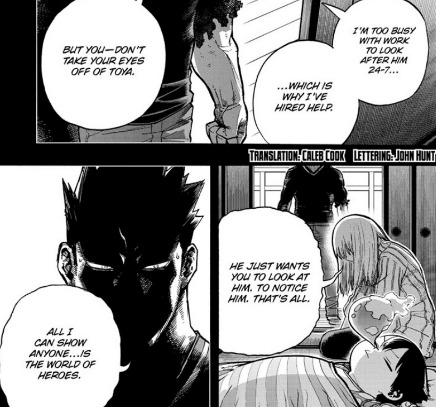
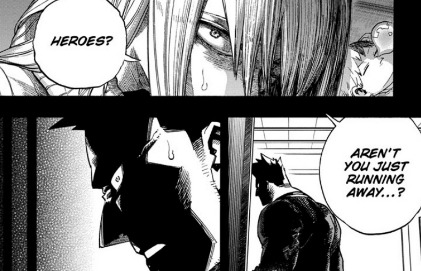
Even post redemption arc Enji behaves in the same way. There is no point in the story so far where Enji actively chooses to help or be a parent to one of his sons, when he can choose to be a part of a big important battle instead. Let me break out the list:
In the Pro Hero Arc Shoto sets the challenge for Enji to show what he can be like as a father rather than a hero.
In the internship arc Enji trains Shoto up as a hero but not a father. When he brings the family home to dinner they're attacked by a villain and Enji stands and watches as his son Natsuo gets kidnapped y a villain because he felt like it would be too awkward if he saved Natsuo because then Natsuo might feel inclined to forgive him.
In the War Arc aftewards Toya is revealed to be alive the entire time, and when given the chance to see his dead son come back to life, Enji not only does nothing but he sits and watches as his oldest son tries to kill his youngest without trying to talk to or appeal to Toya.
After the war arc, Enji doesn't bother looking for Toya and goes back to his job as a hero hunting down AFO. He also makes a promise to Shoto that they'll search for Toya together, only to break that promise multiple times.
In the second war arc, when Enji is given a chance to face Toya face to face, he instead sends his other son Shoto to fight him, while Enji fights against the big bad instead as the number one hero.
When Toya is literally dying and about to burn himself alive in front of him, Enji who has chosen to run away from Toya too many times by this point picks the murder suicide option and chooses to try dying with his son in a heroic sacrifice.
Every single chance he is given to act like a father, he acts like a hero instead. Enji Todoroki never steps out of the role of the hero Endeavor. Internally he's changed, yeah. He's remorseful now and realzies what he's done wrong. However, externally he hasn't. He doesn't do anything different. He neglected his family for his job his entire life so his way of making it up to them is... to keep going to his job.
The problem isn't whether or not he deserves to be redeemed, but rather that there's no change in his actions. Endeavor at the beginning of the story would have shown up to fight AFO in the war arc too, because being the hero is what he does. It's the only thing he does. The story never asks him to be anything other than a hero.
Which is I think a fundamental difference in Rusty and Enji in how they're written. Rusty is a flawed parent, but he's still a parent.
He does favor Dean over Hank, but that favoritism takes the form of him giving Hank more chores when Hank acts out, but when it's time for Dean to rebel giving him space and letting him have his own separate room in the attic. It's Rusty letting Dean have access to the family checkbook so he'll have spending money at college, but cutting Hank off from the checkbook because they agreed if Hank didn't want to go to college he needed to find a job to support himself.
Rusty is parenting these children. He's parenting them very badly, but he's still their parent. Enji never wanted to be a parent to begin with, he wanted to be his kid's abusive gymnastics coach. He wanted a prodigy that he could push and push until they won gold at the Olympics.
If you ignore the fantasy elements then you're left with how these men are shown interacting with their kids in their day to day lives.
Rusty has absolutely no idea what he's doing, so even when he has good intentions he screws up. However, he is making an effort to guide these kids.
Enji was an intentional manipulator more in line with Jonas. He controlled everything in the household, and was actively trying to groom Shoto into someone who would obediently carry on his legacy. He made the choice to isolate Shoto from his siblings so he'd have more control over him. Rusty keeps Dean and Hank away from kids their own age and from having a normal life because he never had a normal life. He doesn't even know what a normal life looks like.
Enji for most of his life didn't want kids, he wanted heirs. He even purchased a woman so his heirs would turn out with the right genetics, and tossed aside the ones that were disabled or born with the wrong quirk.
Rusty made the decision to become a parent on his own. In the last twist in the series it's revealed Dean and Hank had no mother. They were conceived in a test tube, raised in an artificial womb by Rusty himself. He is both their father and their mother. Kids were a deliberate decision on his part. He wanted to have a family, probably because his own childhood was so deprived of any familial love.

Dean: Okay, so who is our mom?
Rusty: Seriously, Dean haven't we had enough family history for one day? I don't even know who my mom is. All you need to know is that the person who gave birth to you. I promise they do.
Remember as stated above the central thesis statement of Venture Bros is "Elige Tua - Choose your family". Rusty chose to bring those kids into the world because he wanted to be a father, it's an active choice his character makes.
Whereas the central statement of Endeavor's arc is "So, heroics aside. What sort of dad are you going to be? That's what I want to find out?" but we never witness Enji doing anything outside of being a hero.
Even post-redemption the only time he ever spends with Shoto is when they're either doing quirk training or working as heroes together. Toya as a character presents this challenge to him, because he's Enji's son, but he's also a villain who's killed innocent people. If he's acting as a hero he has to put a stop to Toya, but a father is supposed to put the safety and well-being of their children above everything else.
We never see Enji make that choice to be Toya's father over a hero. Which is why in story he comes off as a worse father than someone like Rusty, because he never makes any attempt to emotionally bond with his children.
Rusty will sit Hank and Dean down and tell them stories from his childhood. He'll find common ground with his sons to bond over because they've both been subjected to the boy adventurer lifestyle.
Rusty: Dean what are you doing?
Dean: Hyperventilating into my knees. That smell a little like spit up... because I spit up a little.
Rusty: Dean, you just baby burped onto a speed suit. Not a super scientist alive that hasn't coughed a little acid onto his speed suit.
Dean: Really?
Rusty: Why do you think these things are like 95 percent polyester? You can clean off fear-vomit with a wet nap.
Dean: I thought you were used to this.
Rusty: Dean I remember when the action man would wake me up with a gun pointed at my head. He'd just hold it there and pull the trigger. I'd hear the click really loud because it was right against my forehead.
Dean: So it echoed.
Rusty: Right, it sounded like he snapped one of my teeth out. Click! Then he'd go, "Not day Rusty. Not Today."
Dean: Golly, and you took it because you had to?
Rusty: No Dean, I took it because I was Rusty Venture. Boy adventurer. I didn't ask for this life, Dean, but it's mine. Sure, I fall down in the Speed Suit but I get up and Wet-Nap my puke off.
We never get any moments like this with Endeavor and his kids.
He only goes so far as apologizing for his past abuse. Yes, maybe it's cathartic hearing an abuser apologize for what they've done but that's not the question the story was asking. It wasn't asking "Can Endeavor be forgiven?" It was asking "What sort of dad are you going to be?"
The narrative challenged him to learn to act like a father to his family, and he never did. He stayed in the role of hero from beginning to end. It might be cathartic for his victims to hear him say sorry, but it's not good for Endeavor as a character because he hasn't changed and we've learned nothing about him. We already knew he was sorry at the beginning of the arc. Endeavor is sorry and knows he's done something wrong has already been established, but by Endeavor stepping out of the role of hero and acting like a father we could have learned something new about him or his character but no he stays the same from beginning to end.
They're both awful people but at the end of the day Rusty is a father, and Enji is not.
Stories are kind of like essays your English teacher used to force you to read. You need to make a thesis statement in the story itself, and then have evidence to support that thesis statement. The theme of Venture Bros is choose your family, and family is complicated, and in support of that theme we have Rusty choosing to connect with his sons. Jonas is basically nothing more than Rusty's biological father. Rusty's chosen a different way to connect with his sons, and he is their dad, and they can bond about the complicated lifestyle of being a Venture together.
The actions Enji takes in his story don't line up with his thesis statement. The Todoroki Family subplot is supposed to be about how one family was messed up because Enji only chose to have a family to further his career as a hero, and choosing his career again and again made things worse. The thesis statement was that Enji needed to choose to be a dad, but he's never shown doing that in the story.
So Enji as a character seems like he doesn't fit in with his narrative. Which is what I said at the very beginning about Rusty and why he works as a main character. Rusty is the center, because he's had this horrible life inflicted on him by his father, and he's in the process of raising his sons but he still has a chance to choose to be better.
Enji could also work as the center of his story, he has a chance to choose his family over his work as a hero, but he's ultimately not the one who does that, it's Shoto. Which yes Shoto is the main character of the Todoroki plotline, but by the end Enji's gotten as much screen time as his son. If the plot was going to focus on Shoto and his choices to begin with then he should have been the central point. You spent a lot of in story time asking this question with Enji on whether or not he's going to be able to choose to be a father over a hero, and who Enji is outside of being a hero only to not give the audience any answeres.
This again has nothing to do with Enji the person and whether I think he's likable or not, because Enji's a fictional character. He's an idea. If writing is communication, then a writer is trying to communciate some idea with every character in their novel. We're asking what is the author trying to say with Enji, and do they do a good job of getting that message across?
4. What's the Big Idea?
So the above section was mainly about the personal arcs of each characters: How do both of them fail at fatherhood and do they learn to be better fathers over the course of their narratives?
However, these characters are part of a much bigger world. How a character interacts with both the world around them, and the extended cast of characters is another way a story relates it's theme.
Venture Bros and My Hero Academia both exist in comic book worlds. There are people running around in costumes calling themselves heroes and villains and fighting each other on the streets.
In My Hero Academia heroes are basically professional athletes who sell sports drinks and pose for ads and compete for rankings on a big board, and heroics for the most part has been reduced to a day job for people with particularly powerful quirks. Heroism is an entire industry that's for profit, and run by the shadowy hero council who has far more power over their society than they let onto. You could compare Endeavor being the top hero to him is like a combination of being the best pro athlete, and also the best salaryman ever.
Ironically, the worldbuilding of Venture Bros is pretty similar. In Venture Bros. the villains are all unionized. There is a super villain trade union. It's a secret organization known as the guild of calamitous intent, which makes villainy into a bureaucracy.
All villains in the world have to register with the guild. If you're a part of the guild you receive the protection that the guild offers, as long as you follow the guilds rules and regulations. There's lots of small rules, like you can't torture someone who's having a medical issue, and if you're fighting a good guy and they have a doctor's appointment you have to let them go.
They even rank heroes and villains by their threat levels called "EMA LEVELS (equally matched aggression) and then assign you a hero who's about your equal so you won't get killed by someone way stronger than you. The guild basically decides who you're allowed to fight as a villain and picks a hero for you. The act of being someone's arch villain is called "arching" you show up to harass them once a week like a Saturday morning cartoon villain, fight them, then do it again next week. You're not allowed to kill your hero and you're supposed to follow specific rules. The tradeoff is the heroes won't kill you either, because you have guild protection.
The Monarch: I don't know, just keep it cat and mouse not cat and missile.
JJ:: So it's a game? We fake fight? That's ridiculous.
The Monarch: No, it's like fencing, it's about the art of the fight.
JJ: Well, I'm about to deliver my killing stroke. Then what?
Dr. Girlfriend: Then the guild steps up their game. You throw a rock, they throw a knife. You throw a knife, they come to your house when you're sleeping and murder your family.
The Monarch: Look Dr. Venture you call the guild and you get the damn rulebook, I'll be waiting.
The justification for why the guild exists is that in world if you didn't give the villains a system with a bunch of rules, then you'd have a bunch of crazy people in costumes running around causing havoc.
Brock: You wanna what? Shoot him? And all his men and his wife? You could steal his cattle, too. Maybe burn his village down?
JJ: It's an antiquated system. I mean my father did this fake arch enemy nonsense in the sxities. Maybe my brother is good with this namby pamby guy in a costume chases you around nonsense, but I'm not.
Brock: Hey no disrespect Jonas, but it isn't so easy. These guys like their system. It's what they do. You take that away and you're looking at a bunch of pissed off nut bags with ray guns, and giant -- i don't know, a giant octopus / tank with laser eyes.
The villains and the OSI (who are like the GI JOE) of this world have signed a very long and detailed treaty that keeps both sides in a cold world stalemate and lets them fight every week like how the good guys and bad guys fight constantly while maintaining a status quo where neither side wins.
In MHA heroics is a commodity. It's commercialized and sold to the public. Heroes are like professional athletes selling you sports drinks, it's a spectacle to the public, and it's even intentionally made to be that way by the Hero Commission who use heroes as a bright shining light to distract the public while they do shady things like assassinate antigovernmental protestors from behind the scenes. The entire of hero society in MHA is built on the spectacle of heroes.
In Venture Bros heroes and villains are a spectacle too. It's just a job to them. Heroes and villains both show up to work, get in their costumes, fight each other and then go home. In Season 6 of Venture Bros, a parody of the Avengers is actively charging people to provide their services as heroes in the city of New York and you have to sign up for a protection plan if you want to get saved. Then the local mob boss takes a cut of the protection money they're charging.
In both settings the ideas of heroes exist, comic books exist, but the heroes themselves are incredibly mundane, they're just people showing up to jobs and making money for the most part. The only difference really is that in MHA the villains are societal rejects and trauma victims, whereas in Venture Bros they've unionized. In Venture Bros the villains and heroes basically fake fight under strict rules. Even in MHA though the villains need to exist in order to give the heroes someone to fight in front of the public. "Villain" is an actual legal term for a certain kind of quirk criminals with more than three strikes who gets sent to a super max prison if they're caught.
Both of these works are making comic book heroes and villains seem a lot more mundane by deconstructing them with this layer of realism. By making the roles of "hero" and "villain" seem much more mundane, and therefore more human, it also asks us to look at the characters who call themselves heroes and villains as human beings.
The Venture Bros like many richer takes on superhero stories really likes to play with the concept of identity. It's the idea that Good and Evil, Heroes and Villains, are just roles we play. They're not something fundamental or innate they're constructed by the world around us. In the show the main villainous organization the GCI is really just a bureaucracy of larpers sustaining their violent rolelplaying through organized crime. Rich and powerful lunatics who built the world around a game they wanted to play. There's really nothing of substance keeping Rusty on the "Good Guy" side. The good guys are also a mix and match. Shield, GI JOE, FBI. Another exmaple of people who never grew up. Only these people are running things, playing out their childhood power fantasies. They're barely less insane and blood thirsty than the bad guys. So what's even the point of being a good guy in the first place? That's the world Rusty is caught between...[x]
MHA and Venture Bros are both works that feature societies that divide people into two distinct categories "hero" and "villain" and then go on to show that these two categories are not as black and white as they would like us to believe.
Venture Bros features Brock Samson, a character who is ostensibly on the side of the good guys who also highest body count of nameless henchman who we see him gleefully kill onscreen over and over again. There are members of the OSI who are just as trigger happy as the guild so what's the difference between them besides what they've decided to personally identify as? On one side you have the Larpers who are roleplaying villainy, and on the other you have the military soliders who think they're real life GI JOES.
In My Hero Academia you have heroes who are essentially state sponsored peace keepers who suppress anyone who disrupts the status quo with violence, and villains who are rejected from that status quo who eventually turn into violent terrorists. While yes heroes have the responsibility of protecting innocent civilians, most of what heroes do is fight villains, in fact heroes with quirks suited to rescuing people aren't nearly as famous as ones with flashy violent quirks like Endeavor.
You have two sides and one calls themselves villains and the others heroes, but they both use extreme violence as a way to accomplish their goals.
Rusty and Enji are two characters who are caught between these two categories which aren't as distinct and separate as we'd like to believe they are.
Enji is basically the first deconstruction of heroes in MHA. He's a hero who's not interested in saving people, but instead wants to be the strongest and does everything in pursuit of selfish glory.
He's simultaneously the hero with the single most resolved cases in history, but at the same time he's always number two to All Might because he's not "super" enough of a super hero. In a manga where Deku's natural desire to save others make him a candidate to b ahero even without a quirk, we have a character who's a hero for purely selfish reasons. One that only cares about having the strongest quirk because being the best is all that matters to Enji.

In many ways the way Enji treats his family is more like a villain than a hero. Main villain AFO himself comments at one point he wasn't able to manipulate Toya, because his father did too good of a job manipulating him already. In fact you can draw a parallel between his actions of manipulating and grooming Shoto to be his heir, to how AFO raised orphaned child Shigaraki Tomura as his successor.
This is a good use of Enji's character, because making it hard to label him as hero and villain makes us think about who he is as a person instead.
There's an entire episode of Venture Bros dedicated to a villain Mentor named Dr. Henry Killinger, showing up and basically mentoring Rusty Venture when he's at a low point. He gives Rusty money, workers, gets his business up and running again and at the very end reveals that he's setting Rusty up to be a villain to arch his brother as a hero. Rusty is tempted with the idea that he'd make a much more successful villain than he ever would be a hero (because as a hero he's kind of just a loser) but he still chooses to be a hero at the end of the story because he doesn't want to fight his brother.
At which point his mentor, all his hired men, all just walk off and he loses all the money he would have gained and he goes back to being a mediocre super-scientist.
"Doc has the whole thing laid out for him clear as day. This role is here for you. Waiting for you to claim it. You have your nemesis. You have your means. You have the ability and the pain. You can do this and you'd be good at it. And Rusty can look at all of that, everything he's been through and say, "Yeah... but I don't wanna be evil." [x]
Rusty walks away from the chance to be a villain, but he's not exactly a hero either. He runs illegal cloning farms, he does lots of unethical scientific stuff and he's not even remotely the hero his father was considered to be.
Because he doesn't fit well into the category of hero or villain, the show instead asks you to evaluate who Rusty is as a person. He's one of the few characters in the show that's capable of stepping out of those categories.
"That's the great thing about him. Sometimes being disillusioned just means you can see through the whole thing. Sure the whole super science villain game feels stupid. It's not going anywhere. No one's accomplishing anything. It's all violence and roleplay. But at the end of the day it's still real. And it still means something to us. Choosing to be a villain means choosing to be a bad guy. It means relinquishing the premise that you could ever do better, ever actually help anyone. And that's not who Rusty is. He's a scum-bag, but he's a grown up. Even in a show with brilliant characters, old pros, and actual supermen, Rusty is the adult. And adults don't put on rubber masks and terrorize people for fun because that would be fucking silly." - [x]
Rusty spent his entire childhood being terrorized by guys in costumes, so he's now the cynical straight man pointing out how ridiculous this all is. He's the one normal person among the crazies.
Rusty is just too incompetent to ever be like his father. Jonas Venture is scum bag, but he's also a well-respected scientist and a world wide hero. Everyone in the scientific community thinks that Rusty is a joke, and his friends just barely put up with him
Jonas gets away with it because he perfectly fit what society's idea of a hyper masculine strong hero was, and no one questioned it or how he treated his son, whereas because balding, impotent, pathetic Rusty falls so short of toxic masculinity's standards he doesn't get the same respect or leeway that Jonas did. Jonas Venture continually got away with murder, and Rusty can't get away with anything.
He's a pill-popping, middle aged man who ran his father's business empire into the ground who continually gets laughed out of any scientific conference he tries to attend.
He can't be a hero. He can't be his father. He fall short of toxic masculinity's standards. He falls short of everyone's standards. The only way in which he's better than Jonas is that he's a much better father to both of his sons. His greatest triumphs as a character come from bonding with Hank and Dean. Jonas for all his accomplishments wasn't capable of bonding with Rusty because he didn't really care about anyone but himself. Jonas Venture is someone who perfectly fit society's standards of toxic masculinity, but he wasn't a person outside of that.
"Jonas Sr realized this too, but to him, it was a joke. To him it meant being above everyone. Rusty can't be above everyone so he has to meet them at eye level. Part of the bitterness of growing up is realizing that we're all just chidlren who got old. No one knows what they're doing and when you come to terms with that you can look down on people or give them the respect everyone deserves. How you treat children says a lot about how you treat people which in turn says a lot about you." [x]
Now returning to Endeavor we run into the same problem that we did earlier. This whole post is comparing Rusty and Endeavor because they are the protagonists, but Endeavor is far more like Jonas. He's someone who sees through the hero system and only cares about climbing to the top out of his own self interest. He knows it's a game, but he wants to win at the game.
Enji even sort of looks like Jonas.
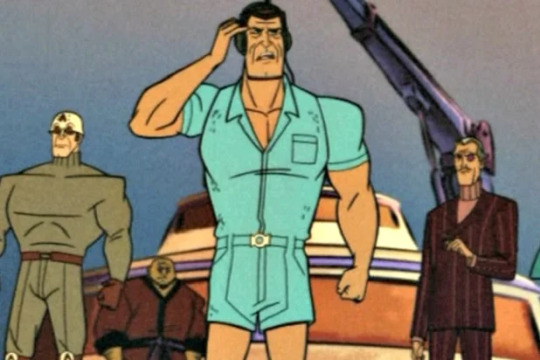
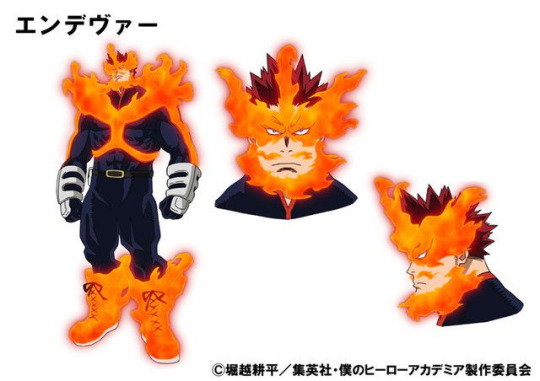
They're both extremely bulky men at peak levels of physical fitness. Meanwhile Rusty is a balding, short and out of shape middle aged man.
In story Jonas is still widley beloved by the public and is constantly praised, while no one but Rusty is aware of his faults, but there's a reason for that. Jonas is someone who is basically allowed to do anything he wants, because the patriarchy means all of society is built around letting men like Jonas succeed.
Jonas is also someone who literally uses his position as a hero to manipulate people into getting what he wants and glorify himself.
Jonas can casually destroy people's lives, all while still believing he's the good guy because in his world being good guy is just a role to play and he plays it well. One of the best three episodes of the series is the Morphic Trilogy, the opening to season 7 where some of Jonas's past crimes are revealed.
In the past he tricked a married man into making a sex tape with him, and then when that man Don Carraldo aka the Blue Morpho turned out to regret that, he used the tape to constantly blackmail him into doing his dirty work. Killing people in secret while Jonas Venture remained Squeaky clean. After years of being forced to act as a mercenary for Jonas, the Blue Morpho died in a plane crash. Jonas then revived his best friend as a cyborg. He got bored of his new cyborg within a few months and reassigned him to babysit his son Rusty. The cyborg glitched and started to strangle Rusty and then he snaps his friends neck, and throws the cyborg away in the garbage.
Jonas can just completely destroy a man's life because he can. Because everyone around him enables him and no one is going to stop him. Because this is how people in power act when they're given too much power. Because might does not make right.
He's the gold standard. He's the ideal. Who would question him?
Enji occupies a similar position in the story, where he fits the role of a hero so well that even when his family abuse is revealed to the public basically every character and their mom is tripping over themselves to defend him.

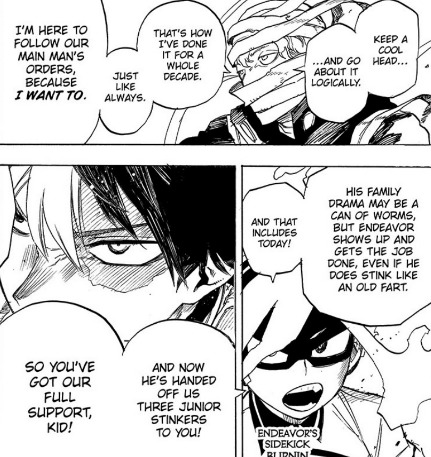
Jonas is constantly praised in story years after his death and every bad thing he's done is swept under the rug, but that's because number one Jonas was a manipulative monster, and number two it shows toxic masculinity is a false ideal. This is how Jonas who everyone thinks is the ideal man's man, really acts. This is what he gets away with it, because the thing society glorifies are toxic and bad.
When people bend over backwards to defend Endeavor what does it say exactly? Because we're supposed to believe that Enji's willing to work for redemption even if people don't forgive him. We're not supposed to think Enji is a manipulative monster intentionally twisting people around his finger like Jonas was.
There are some ways Enji is like Jonas, especially in his backstory. He did use his money and influence to buy a woman. Rei was definitely not going to get the option of divorcing him if she actually wanted to leave.
However, in the present time we don't see Enji doing the kind of manipulation that Jonas does, because really he doesn't have to. Hawks does it for him. There is a character in the narrative named Takami Keigo / Hawks who is a little boy that Enji indirectly saved as a child by putting his father in prison. Because of this he is obsessed with making Endeavor live up to the hero he imagined him to be when he was young, and does everything he can to prop Enji up behind the scenes and make him look like that hero to the public.
Hawks is a whole other can of worms, but in effect what this means is there is someone manipulating public opinion in favor of Endeavor so he'll be able to shine in spite of the numerous skeletons in his closet, it's just not Endeavor himself. Hawks also takes away a lot of the active decisions on Endeavor's part. When Endeavor chooses to ignore Toya in the latter part of the story, it's not Endeavor's choice, he's just following Hawks plan to fight AFO. When Endeavor makes a public apology, Hawks is the one who wrote it for him.
The result is that Endeavor comes off as less of a Jonas, after all Hawks is the one manipulating his public image. On the other hand, he's also less good of a character because he's not making choices anymore. It'd be better If Enji was trying to manipulate the public into forgiving him in the wake of his scandal, because that'd be an active choice on his part. When a character makes a choice it tells us something about who that character is.
Horikoshi doesn't want us to think that Enji is the kind of selfish monster that Jonas is, but then who is he supposed to be?
The entire point of this post is to compare Enji to Rusty, but Enji's far too successful to be Rusty. Rusty is a failure in basically everything he set out to do in life. He's the butt of the series jokes. He's the victim in as many ways as he's the perpetrator. He had a lot of money and then wasted it all. None of his inventions are succesful. The scientific community thinks he's a joke, or they don't even know who he is. Women won't even go near him. No one ever defends him. At no point in the story does someone stop and say "Hey, Hank I know your dad's an asshole but he's really good at science so that makes it okay."
Rusty's such a failure at being a hero that he's forced to be a person. He's as equally narcissticic and toxic as his father, he treats women like objects for sex and comfort like his father does, he just doesn't get away with it. You can't point to some heroic feat of his that justifies his toxic behavior because he doesn't have any.
The story however can't stop singing Enji's praises for what a good hero he is. He's never forced to step out of the role of hero and be a person like Rusty is, and because of that the message of his character becomes confused.
Are we supposed to think he's a manipulative narcissist like Jonas is?
Are we supposed to think he's an incredibly flawed individual trying to figure out how to be a father late into his kid's lives like Rusty?
Rusty has a clear role in his story, and what the author wants to say with Enji is unclear.
Everyone praises Jonas to death and no one can see him for the terrible purpose he is, because that's the point. Venture Bros is about failure. It's about the death of the space ag optimisme. It's about how much the boomer generation sucked.
From the Radiant is the Baboon Heart Commentary.
Question: Did Jonas only keep Rusty around for the press and his cloning tech or did he actually care about him?
Answer: . The show has a villain called the monarch, but if you watch all the show the villain is Jonas Venture Sr. He is a bad dad. What you need to realize is that in this kind of baby boomers gen x millenials kind of thing we are of the generation that had bad parents. For the good and the bad of it. The good was we were all left alone by our parents, and we had a freedom in our thought that I don't think the millennials have. Because we made the millennials, and we were like You know what Our parents suck and we're gonna be great parents." And they helicoptered them and they gave playdates. [...] I did hate the boomers, they were awful fathers they were terrible people they did horrible things to our world, and at the time they were celebrated as good people. They were a bunch of hippies and they failed and they did everything wrong that they wanted to fix [...]. You and I are lost people we observed our generation. We are fully aware of it. We observed our parents generation. My actual father was a classic distant father, very bright had a lot of work to do, but I observed that generation and the way that toxic masculinity was set in stone. Just branded onto their tombstone. Toxic masculinity. Our generation grew up wanting to be adults, childhood was something that was not examined. When people were growing up we wanted to be grown ups, we wanted to wear suits, it was something you guys don't have. It was a very different way to grow up. So we wanted to be like this generation that immediately we looked at and went oh my god they're monsters. So Jonas Venture Sr. is a monster.
Jonas is a commentary on how much the boomer generation is glorified, and how much they suck if you look at them critically at all. It's written by authors who were observing basically three different generations of parenting, the way boomers parented, the ways Gen-Xers did in response to that and now the way millennials act as they reach adulthood. Rusty can't escape Jonas' shadow because Toxic Masculinity is set in stone.
The role of Jonas in the story is to serve as an antagonist to Rusty and be the cause of Rusty's struggles, and also his impetus to change because Rusty doesn't want to be like his father. Rusty and Jonas both exist as characters to show the author's observations on parenting through the generations, and yeah it's a very american idea of parenting and family but it's you know... a cartoon made in america.
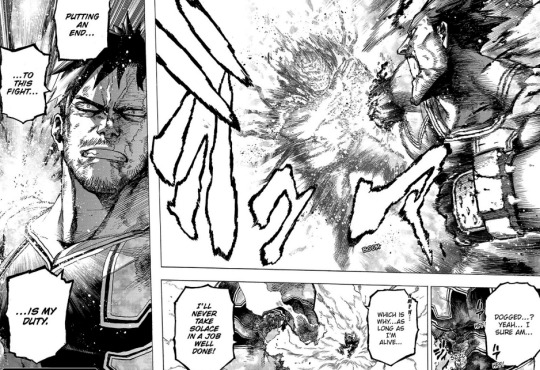
What is Endeavor's role of the story? If he's a criticism of toxic masculinity he's not criticized enough, because the story spends just as much time glorifying him his obsession with strength and power as it does criticizing him. There's no scenes like this for Rusty to show off how cool he is, or how determined. The story wants you to believe that there's something redeeming in the fact that Enji is always struggling to be the greatest, even though his obsession with being number one is what caused him to abuse his family in the first place
It's criticizing and praising Enji's obsession with power in the same breath, because My Hero Academia can't fully deconstruct toxic masculinity the way that Venture Bros can. It keeps trying to find something redeemable in Endeavor's toxic pursuit of power, but that's the whole point. Toxic masculinity isn't redeemable, because toxic masculinity is toxic. There's nothing wrong with masculinity itself, or the values people traditionally consider masculine but the kind of hyper-aggressive pursuit of physical strength Endeavor chases after is toxic masculinity. In Endeavor's mind men are warriors, protectors and providers and nothing else, and he never learns to be anything else either.
MHA would never treat Endeavor the way Vbros treats Rusty, constantly humiliating him or making him the butt of jokes. It would never make Enji out to be weak or pathetic the way Rusty is.
The central concept of Endeavor is struggle. His chosen hero nae "Endeavor" means to try hard to achieve something. His entire character is based around the concept of struggle. His central struggle is that he's a normal guy trying to compete with a superhero like all might, and everything he does he struggles with even if that struggle is pointless.
However, in the actual narrative itself he doesn't struggle. He definitely doesn't struggle the way Rusty does. Rusty's a lazy, incompetent, and entitled man sitting on a pile of money he didn't earn who thinks he's entitled to more who fails at all he sets out to achieve. Rusty never gets what he wants, and even when he does get what he wants like when his brother leaves him a billion dollar corporation in his will, he bankrupts that company in two seasons. Struggle means that the world isn't going to give you what you want and you keep trying anyway.
Endeavor's never subjected to nearly the same amount of narrative punishment that Rusty is. He's still well-respected. People defend him. He fights in all the major battles of the series and gets victories. No one's disgusted when they hear that he's a wife beater. We are told that he struggles, that the central concept of his character is struggle, but the narrative keeps handing him wins and cool moments.
As I've said above several times, Enji's never really forced to step out of the role as hero because he's not a failure the way Rusty is.
My Hero Academia hits some of the same notes as Venture Bros. It's criticizing apanese hegemonic masculinity, specifically that of salaryman masculinity and the way men in japan completely put their careers over their families. Read about it here in this convenient power point presentation. Enji is essentially an incredibly successful salaryman who has completely disappeared from his kid's lives in order to earn money and success and believes that he's still entitled to be a father because he's performed adequately in his role as earner of the household.
The story does show how giving too much power to the patriarch of a household can cause a house to fall apart. It shows that traditional family roles aren't all they're cracked up to be. Enji is assigned the role of father but he doesn't live up to it. The very rigid and traditional Todoroki Household crumbles because basically everyone fails to live up to their roles. The father isn't present. The mother isn't a good caretaker. The first born is defective. The youngest is given all the responsibility of the first born. No one is able to live up to those roles because maybe those rigid set in stone roles shouldn't exist in the first place.
Once again though, that's all in the backstory. Enji never changes from the Pro Hero Arc to his last showdown with Toya. The story never tells us anything about who Enji is as a person. Therefore, it also never comments on Enji's role as the patriarch. What is Horikoshi using Enji to say about patriarchy besides... it exists?
The story shows you how destructive the idea of patriarchy that Enji represents can be in the backstory, but because Enji doesn't do much for 90 percent of the story it never says anything about how Enji can learn to be a father or if it's even possible for him to be a father this late in the game. Because Enji's story isn't about fatherhood ultimately, it's about him becoming a less selfish hero.
Which might just be a problem with the whole of MHA. Venture Bros is about who the characters are outside of their identity as heroes and villains, but MHA is ultimately more about the optimism of heroes and what it means to be a hero than these characters personal lives.
Rusty is never going to be as sucessful as his father. He's always going to be mediocre, ad even if he's sympathetic he's still a scum bag. However, Rusty has one thing his father doesn't have which are his two sons who he made a deliberate decision to get closer to. Unlike a serial user of people Jonas, Rusty has the ability to actually love and care for people and he chooses to make those connections.
Endeavor never chooses to be a father. He didn't choose to go to Toya's side. He was too busy being a hero and fighting the big bad. As a result of that we never learn anything about Enji as a character outside of being a hero because he never chose to be anything other than a hero.
He also never failed. As I said the narrative kept handing him wins. You'd think never choosing to see Toya would mean he can't save Toya in the end, but in the end of the story Toya's just fine. There are no consequences to his choices. He's revealed to be an abuser to the public but he gets to keep being a hero. Enji never really fails in some big way that forces him to rfelect and change on his actions, so he just keeps doing the same thing from beginning to end.
Which is why Enji doesn't work as a character compared to Rusty. He doesn't fail. He's supposed to be a flawed protagonist struggling against himself, but he never really loses. He's too much like Jonas and not enough like Rusty.
"I think Jonas was something of a boy adventurer himself, and made his kid be it. But also put his kid on TV to cash in the residuals. He was just a shitty parent. When he went to bed he was just, he was moral, and he was fighting the good fight. When he woke up he ignored his son and made his son do terrible things. He voted for nixon like a good american. He was a winner and our show is not about winners. Our show is about losers and people we love."
Jackson Publick. n
#venture bros#enji todoroki#mha meta#bnha meta#my hero academia#i put so much effort into this post only two people will read#rusty venture#doctor venture#doctor thaddeus venture#endeavor
321 notes
·
View notes
Text
Thinking about the plot parallels in bnha again, this time as they relate to Izuku's goals--because he's had a specific goal for a long time, and it's not just being the number one hero. Saving is Izuku's half of heroism, after all, and yet from his perspective, it could be said that he fails in one continual regard: saving Katsuki.
It seems to start with the sludge villain. He doesn't exactly fail; he has a positive effect on the situation, at least physically, and Katsuki survives unscathed and more or less emotionally intact. From a literal standpoint, Katsuki has been saved, but Izuku isn't directly the one to save him (and is indirectly the one who put him in danger).
Then training camp happens, and Katsuki is a victim again. And Izuku is frozen there in the forest, unable to keep reaching for him. (And when he plots the rescue, he can't be the one to enact it.) Katsuki is rescued in the end, but Izuku doesn't save him before damage is done--because this time, Katsuki is physically okay, but the psychological effects make themselves known at Ground Beta.
Then there's the next time. Katsuki takes the hit for Izuku, and this time, although he survives, he sustains physical harm. It isn't as though Izuku can prevent this, but Katsuki's only there because Izuku told him about OFA, and is only putting his life in danger because of Izuku. From Izuku's perspective, he hasn't protected Katsuki.
And then there's the final battle, a bigger, more catastrophic reflection of what happened before. Except this time, Katsuki doesn't survive. And once again, Izuku hasn't saved him.
Izuku wins to save; saving is what motivates him. And although he's been victorious time and time again, he has never decisively saved Katsuki from a true threat. This is a pattern his entire life.
His entire life, because it didn't start with the sludge villain.
It started with the river. Katsuki didn't take his hand, and Izuku wasn't able to help him. It's the start of Katsuki's internal conflict with weakness and victimhood, and the start of Izuku trying to be there for him.
Katsuki has to contend with needing to be saved. Izuku has to contend with failing to save him.
#bnha#mha#bnha meta#mha meta#bakudeku#bkdk#in a sense#deku#kacchan#bakugo katsuki#katsuki bakugou#bakugou katsuki#katsuki bakugo#midoriya izuku#izuku midoriya#is this too evident or is it just extrapolation? i don't know#but i like thinking about all the patterns#and how they grow in severity
428 notes
·
View notes
Text
what comes next though? (MHA ch. 413)
// major spoilers for mha ch. 413 since its leaks, so please stop reading if you arent quite caught up. i havent written one of these in a LONGGG while lmao.
ANYWAY, with all that being said.... this week's leaks huh?
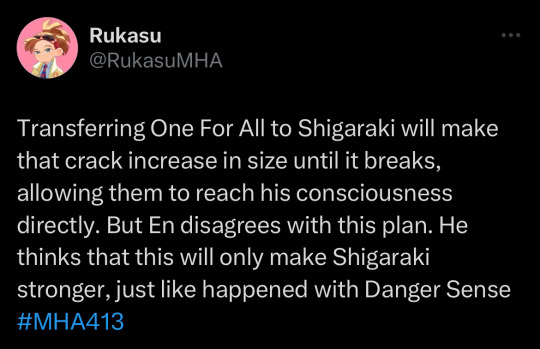
We saw it coming a long time ago, we speculated it to hell and back, we made aus and fics, and now it's finally here. The conclusion we've reached and the one that's been hinted at since the release of Heroes Rising in 2019:
bnha is going to end with deku giving up one for all and becoming quirkless.
(LOTS of words under the cut -- youve been warned.)
For those who are a little lost; the basic premise of the ending we are hurtling towards is that Kudou (the 2nd user of ofa) has a plan to take down Shigaraki. With AfO dead and gone + Shigaraki becoming so powerful he is essentially invincible -- theres no other choice for the heroes other than destroying him inside out; the plan being the equivalent of charging a battery so much it explodes.
the way they're going to go about this is by essentially, feeding Shigaraki bits of One for All until he's given all of it -- then allowing the vestiges of the previous wielders to create a massive revolt similar to what SnS did until they can successfully tear him apart from inside the "quirk realm" and shut him out. Kudou volunteers to go next since danger sense has already been taken, and if Shigaraki uses gearshift again after Deku already used it twice, Tomura's body will likely shutdown and receive twice the backlash Deku does when he uses kudou's quirk.
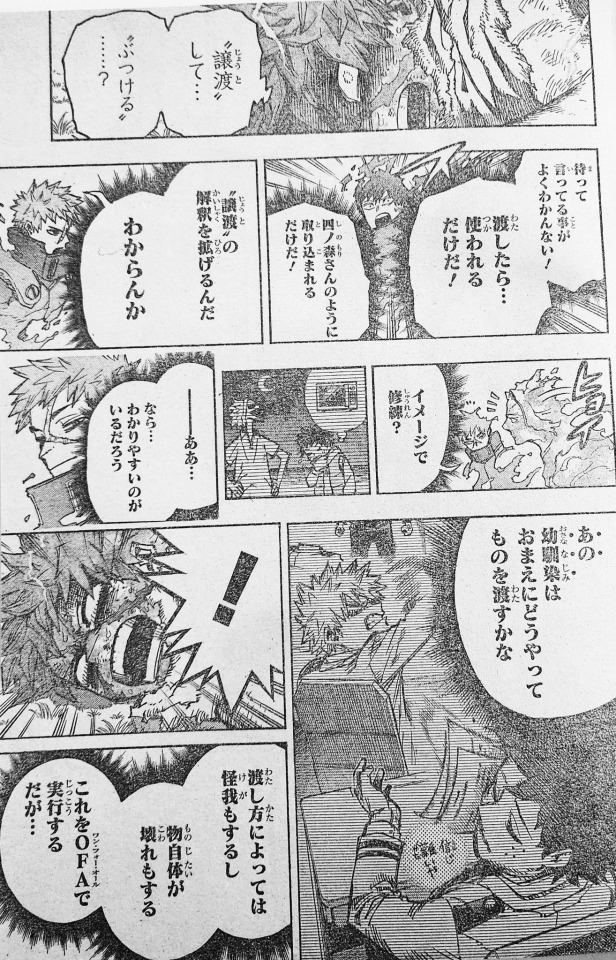
(sidenote: funny as fuck that deku only understood once kudou equated the strategy to bkg throwing papers at him. bro stupid af.)
its a sensible(ish) idea. one that seems plausible given the context of the last hundred or so chapters with heroes like Hawks and SnS having their quirks revolt against both AfO and Shigaraki in a way that makes it clear that its not uniquely OfA that animates the souls of peoples quirks. Its inherent. Quote, Nana Shimura, "romantic" even.
(let it be known though that i think hori absolutely did not plan on delving into this plot point as much as he is now. ill explain in a bit, but heroes rising was 100% a major factor of why he moved in this direction.)
That being said, the conclusion of the plan (and subsequently, the major plot of bnha) is as follows: Deku gives up One for All to Shigaraki. One for All unites with All for One within Shigaraki and destroys it in one final clash between Yoichi and his brother. The break in the barrier of Shigaraki's hatred will part, letting him find the consciousness of Shimura Tenko behind it after years.
Shigaraki dies, taking OfA and AfO down with him,
and then Deku is quirkless once more.
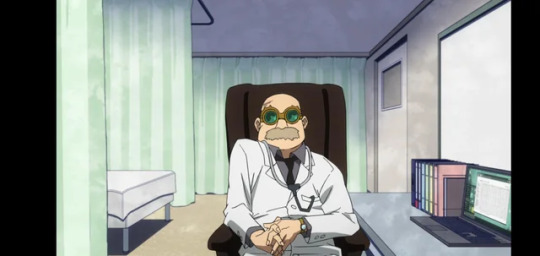
Sad conclusion aside for now, I firmly believe that no matter what way you look at it; Deku was always meant to end the story without a quirk. Given some of the original drafts of bnha where Deku was never supposed to be given a quirk in the first place, this is clearly unsurprising. What's more is my favorite piece of information relative to katsuki and deku's character development:
the fact that heroes rising was (one of the) ideas for the original ending of bnha.
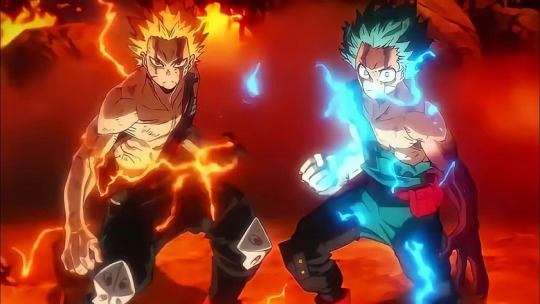
a refresher for some of you: heroes rising is about class 1a going to the isolated village of nabu island and defending it against an upcoming big bad villain named "nine" with a quirk that is essentially a scaled down version of all for one. katsuki and deku eventually resolve the conflict together via brute force by deku giving katsuki ofa, them rushing in while the quirk is transferring and both of them have it, and then ultimately defeating nine at the end. the movie then of course circles back on deku losing one for all, undoing that consequence by saying the transfer never completed bc ofa chose him over katsuki and they all move on to the endeavor agency arc with katsuki remembering absolutely nothing of the final battle.
many fans often misunderstand one of horikoshi's quotes about the movie in that it was, without a doubt, the original ending of bnha. for the sake of accuracy, that is not what horikoshi really said; what he ACTUALLY said was something closer and to the tune of of how it was "one OF the endings" he planned on using for bnha, but his original idea for how the story ends "has not changed one bit."
obviously disregarding the cop out where ofa sticks back to izuku in order for the series to continue as normal; this can only confirm that bnha was going to end with midoriya izuku quirkless whether katsuki was involved or not.
so what's different this time?
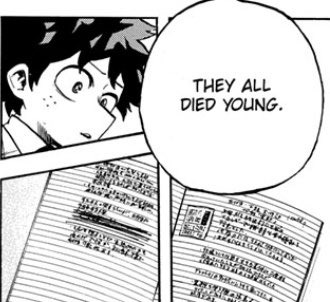
its hard to figure out how far horikoshi had planned the ending of bnha with heroes rising's prototype conclusion in mind. if heroes rising never pulled through and horikoshi had planned on bnha ending with the shared ofa transfer and katsuki continuing deku's legacy -- then that means katsuki wouldve died an early death because of all might's confirmation that only quirkless people can hold on to one for all without dying young, meaning he either intended on katsuki dying soon after the story ends or only planned that plot point after heroes rising was released.
the plot as well of heroes rising's conclusion cannot have been thought of all that early on because of ANOTHER tidbit of information that changes perspective of the entire series: in that,
bakugou katsuki was never supposed to be a major character to begin with. (keep an eye on this link; i reference this interview a LOT)
he was not supposed to have an arc. he was not supposed to become a major focal point of the series. he was not meant to be the hero he is in the story today. bakugou katsuki was not written with the intention of being a major narrative this late into the story -- instead originally only existing as a character that deku would surpass within the first few arcs.
but then katsuki cried, and deku apologized, and then opened his big fat mouth, and then told him a secret he didnt even tell his own mother -- and suddenly bakugou katsuki was not just another footnote in deku's story, but a legitimate character that grew and created one of the most loved (and hated) character turnarounds in shonen history. he started of as a literal EXTRA before snowballing into the very same character horikoshi decided would defeat all for one, the original scariest antagonist of the entire series. someone not even ALL MIGHT could defeat.
but circling back, yeah. heroes rising was definitely not the ending horikoshi thought of first, nor was it the ending he thought of last. ultimately, it was simply another route he couldve taken into wrapping up deku's fate into what it was (probably) always meant to be:
deku was gonna lose one for all no matter what.
it's kind of fitting, honestly -- for this to be the ultimate conclusion to the series. it makes the most sense, since what sent deku down this path so many years ago was his mother apologizing to deku for being quirkless; as if being quirkless meant he was born inferior to those who had quirks. people, after all according to deku's famous beginning monologue, are not born equal.

Even still, i thought to note: deku never stopped wanting to be a hero. we all know this, obviously. this was his driving force -- but then when you REALLY think about the implications, you have to ask. what the heck was deku even planning to do?!
he had ideas. he had hope. he wrote notebooks for the future and thought of his costume for being a hero -- but not once do i remember him writing about his hero experience as if he was suddenly going to develop a quirk. he was planning on saving people quirkless -- an extremely interesting motivation especially when he couldve so easily chosen to walk the path of being a doctor or engineer instead if he wanted to save people so badly. its a story about conviction, about doing the things you wanna do in the way you wanna do it no matter what ANYONE else says and hey wait a minute that sounds familiar
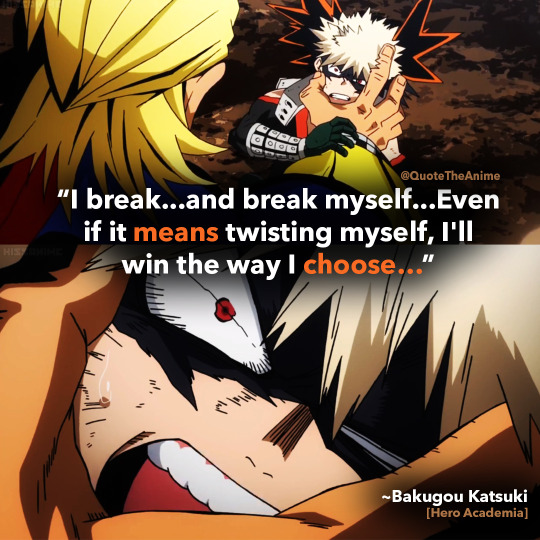
it doesnt quite read that way at first, especially because of how izuku almost listened to all might about "being realistic" when the first met and nearly gave up on becoming a hero entirely, but izuku is a lot similar to katsuki in the sense that no matter what gets in his way -- he is determined to achieve his dreams in the way HE CHOOSES, and not the way that is more "convenient".
even when you look at just his name, "deku" in the way that uraraka had interpreted it (dekiru -- "you can do it!") and the way deku reexplains it to katsuki in deku vs kacchan 1 ("the deku that doesn't give up!") you can so easily tell that deku from the very beginning has only ever needed the slightest push to pursue being a hero, quirk-or-not-be-damned. hell, we even see a glimpse of this possibility in the sports festival race when deku absolutely DECIMATES not just bakugou but also TODOROKI (as well as every single other damn student participating in the festival) with nothing but robot scraps and his balls of steel. it just so happens that until the promise of one for all, no such encouragement or push was ever given to deku in his pursuit of heroicism, most especially in comparison to katsuki who had been receiving praise and validation for his goals his whole life.
i'd argue that deku's conviction is even stronger than katsuki in a way no other person seems to recognize (except maybe katsuki himself). katsuki had received only positive feedback and zero competition for his goals growing up while deku received nothing but discouragement. both of them kept the conviction of being a hero for TEN YEARS; neither wavering til the day of the sludge incident.
that aside; what comes next?
we know the story after that. deku gets his quirk, he goes to school, he fights, he drops out, he fights some more, and now he's standing before shigaraki tomura with every quirk of one for all unlocked and over twice the power that all might had in his prime -- fully knowing he's about to lose EVERYTHING in order to defeat shigaraki.
this is deku we're talking about. he doesn't care. he knows the implications and what that will mean for his dream -- but his goal right now is in front of him. his goal is shigaraki, consumed by hatred, threatening to take down the world izuku loves most into a pit of misery and decay because society failed people like them. does he care? probably. will he refuse to give up his power if it means not saving the world and fulfilling one for all's purpose? absolutely not.
deku has made all might's quirk his own, but one for all does not belong to him. it belongs to yoichi. and kudou. and bruce and nana and all of the other users who built that quirk for generations in hopes that one day, someday, someone would be able to yield it all and bring down the monstrosity that created it in the first place. deku will not hesitate, but also deku knows what he will lose.
i have... a few things i dislike about this.
Admittedly, i do think that this is a better resolution than the simple brute strength approach of Heroes Rising. For one, while i do love heroes rising with my entire heart and soul, i firmly believe it would not have been a satisfying conclusion to the core lessons and teachings bnha tries to impart throughout the story. simply outnumbering and outpowering afo/shigaraki would not be enough to close yoichi's story and one for all -- much less the story of shigaraki himself as tenko, the boy consumed by hatred.
Still, this new ending that horikoshi has laid out leaves me with more questions; as well as large expectations for how izuku's character will close out. its complicated, because deku's evolution and development is subtle and intricate in a way i havent seen from other shonen protagonists and i worry about doing it justice.
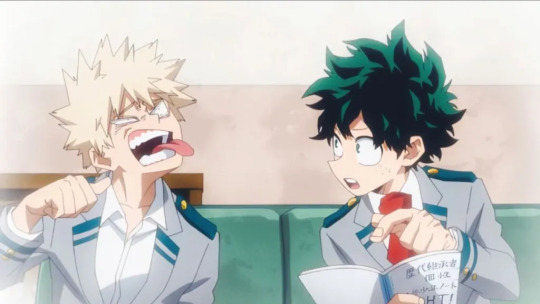
but most of my problems have to do with bakugou katsuki.
(aint that the truth)
i know i mentioned that bakugou was never intended to be a major character, but i want it to be known that that was only in the beginning. season 1, maybe even season 2 -- but horikoshi had said it best himself in that bakugou katsuki, against his permission, had gained a life of his own and inserted himself into the very grain of mha's story. you cannot deny this.
he is the series deuteroganist inarguably. one of the most beloved characters and one of the most attentively-written development arcs in the whole series. katsuki in and of himself embodies major themes in bnha that make it so that ditching his development and impact last minute after defeating all for one would reflect poorly upon the conclusion of the story itself. he and deku are intertwined in arcs -- even if they do have separate paths at the end of the day. katsuki is the one izuku told about the quirk. the one who followed izuku during the paranormal liberation arc. the one who understands one for all and is determined to learn about it more than anyone else barring all might and deku himself. the one who is closer to izuku than anyone else.
it can't be over for their arc, no matter what way you see it. friends? rivals? hero partners? what comes next, when the smoke clears? what comes next when izuku gives shigaraki hell, like katsuki told him to?
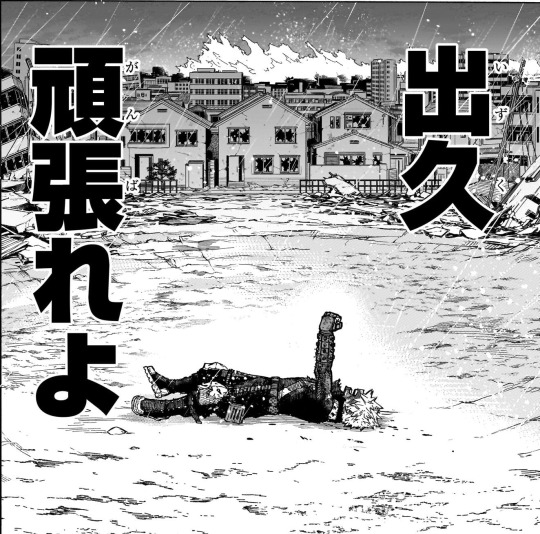
katsuki's atoned. we accept that, have known it since chapter 285 and have continued to know it until the iconic apology in the rain. that's not where katsuki stops however, because we know that its not all about begging for izuku's forgiveness nor atoning for himself. its about catching up to izuku -- the last words he uttered before shigaraki crushed his heard say it all.
"can i still catch up to you, izuku?"
since the moment katsuki died, we've been given a metric ton of material to read through what he and izuku have become in the story. firstly, the point of katsuki being the person closest to izuku. what does this mean? what does that say about katsuki? is he supposedly the person izuku loves the most? the person izuku believes in the most? i'd argue these two criterion would easily fit his mother or all might a lot better -- not his childhood friend turned bully turned rival turned barely-friend. katsuki sure as hell didn't believe he was the person closest to izuku before shigaraki brought it up as evidenced by the fact that he let IIDA bring deku back to UA -- and neither does izuku as far as i bet. what was shigaraki's intention?
katsuki heard that statement. he hasnt said anything, but he definitely heard it. its an open end that is left entirely unanswered PRECISELY because katsuki fought afo on his own and izuku is about to tackle shigaraki without katsuki by his side. if it was heroes rising's ending wherein they would both fight shigaraki and take him down together -- then that statement would easily be answered by how their strength and bond is the one thing that gave them an upper hand in the final battle. other than that... i'm not entirely sure how they're going to have katsuki and izuku acknowledge katsuki's brief "death" and Tomura's reasons thereof.
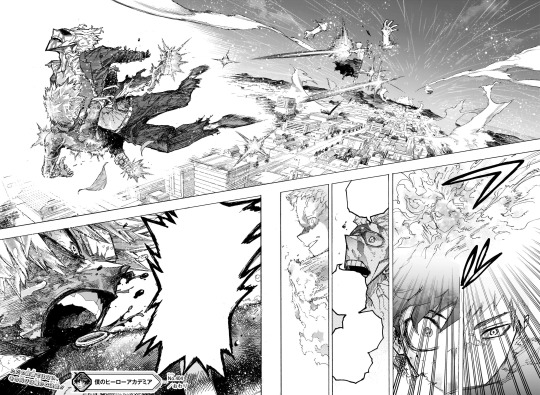
But fine, lets ignore that for the time being and move on to what happened when Katsuki came back.
katsuki answered izuku's cry for help. he came back to life in the last moment to save all might when izuku was too busy fighting tooth and nail to win. they are the penultimate example of two sides of a hero; the win and save. not one without the other. every single parallel thus far between izuku and katsuki have always been to draw attention over and over to each of their stubborn convictions to win and save under all might's tutelage.
katsuki has chosen to prioritize winning and fighting over saving and rescuing over. and over. and over. and over again. at every single opportunity from the very beginning of the series. in usj, in sports festival, in the final exam, every choice he's made up until --
chapter 285 - bakugou katsuki: rising.
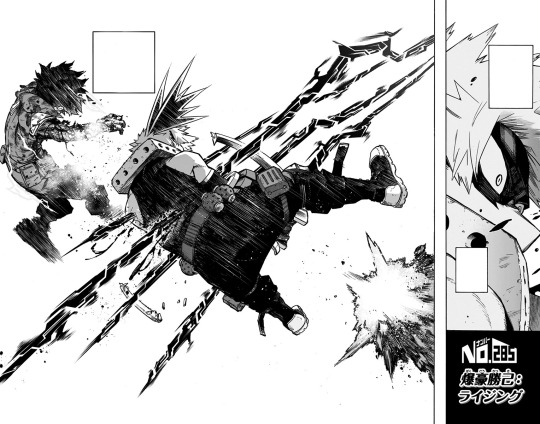
he chooses to save izuku in this instant. as he says, his body moved on its own -- or in other words, he felt like how izuku has always did since the sludge villain incident. this is bakugou katsuki catching up to midoriya izuku. its katsuki realizing that he needs to save so deku can win, and actually being okay with that for once. it's a major turning point in his character that clearly tells even horikoshi that there's absolutely no way katsuki can go back to being a side character within the plot of bnha after a development like this.
and then, after this instance, we notice it happen again and again. katsuki choosing to save to win instead of winning to save. katsuki protecting best jeanist against the nomu. katsuki coming to chase after izuku when he runs away from UA. katsuki (in a way) saving aoyama when its revealed he's the traitor. hell, katsuki saving ALL MIGHT as soon as izuku -- the savior -- begs someone to save his idol when he can't because he's too focused on trying to win.
so what changed?
what changed since the moment of chapter 285 was katsuki accepting his fears and anxieties. katsuki letting go of his aversity to working with deku. the reason katsuki started accepting the path of saving to win was because he TRUSTED deku to win where he couldnt.
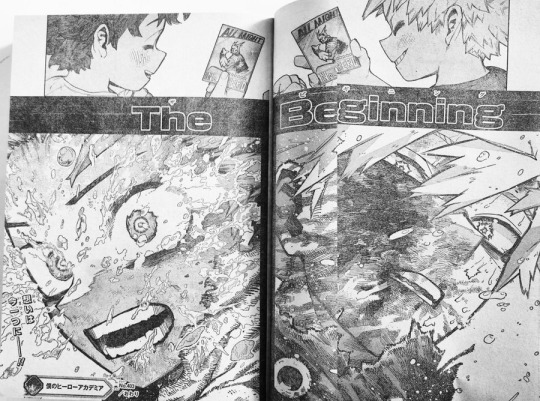
this is katsuki accepting that him and izuku already surpassed all might together.
but katsuki said it himself. it's not over. he accepts that him and izuku are finally on equal footing -- hell, he admits he's the one who needs to play catch up. it's not about katsuki conceding to weakness, but katsuki being able to trust in izuku to finish the job. the point is that they both will break and break until they win the way they choose to, and the other will be there to win while they save and save while they win. moreso, katsuki still wants to be number 1. he still wants to catch up and surpass deku. he wants to fight by deku's side. but ... as we've established:
deku will be quirkless soon.
my problem (or, i guess, curiosity?) with the path horikoshi seems to be going down for the end of this story is what happens to this end? what happens to the wonder duo? i believe in a quirkless deku plot as much as the next person -- but any reader would find it easy to see that once deku loses one for all, he will not be nearly as efficient nor quick nor capable of a hero as he once was. especially not against a developed katsuki with mastery over cluster explosions.
he will lose one for all and he won't ever be the pro-hero he was going to be before the final war arc. katsuki will get number 1 surely, but will he be happy about this resolution? i don't think so. All Might himself had said it when Katsuki spoke to him about his relationship to Izuku; that the twin stars reminded All Might very much of his own rivalry with Endeavor and the bitter feelings it created.
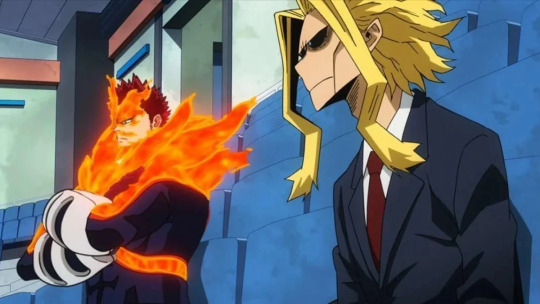
endeavor expressed regret and a bitter end to their rivalry; the acknowledgement of the bitter truth that the only reason he was the number one hero is because all might lost his own quirk. he knew he didn't deserve the mantle all might had held for a long time before him. he knew that he was still only just playing catch up with the wisdom and understanding of heroicism that all might had in his heart from the beginning. endeavor will likely retire from being a pro-hero unsatisfied with this truth and his own victory at becoming the no.1 at the very end -- never feeling like he truly surpassed all might of his own accord. both enji and toshinori -- victims of their destiny.
is this the fate that will befall katsuki once izuku is quirkless for good?
There are many questions I have in wake of the recent chapter. The end of the series is here, and that's a whole can of worms i haven't touched in and of itself. We all saw this coming; some of us know that this was always going to be Izuku's fate since the beginning of the series. But now that it's more than just izuku's character involved in his dreams of being a hero -- i dont know how this series is going to conclude and if it will be satisfying to any means. there's a lot of questions i still have; bakugous arc feeling incomplete ever since he came back to life, the conclusion of all might and one for all's dreams now that they will disappear altogether. where does deku go after this? where does bakugou go? where do any of them?
i guess i gotta wait and see lol
#bnha spoilers#mha spoilers#bnha#bakugou katsuki#toshinori yagi#all might#midoriya izuku#deku#kacchan#my hero academia#boku no hero academia#mha meta#bnha meta#this was a long one ouf#anyway this is ship free technically; its just mostly me going BUT KACCHAN?
112 notes
·
View notes
Text
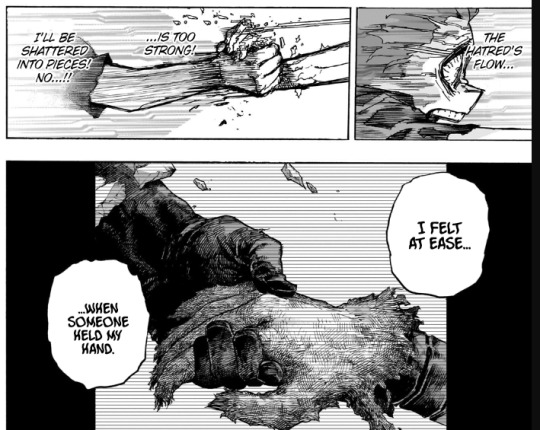

It's interesting that Deku's thought about that time Iida held his hand during the 'save Deku' storyline twice so far. As if Deku wants to do for Tenko what Iida did for him (ie the hero who will take the hand of a lost child).
#like I think this makes it obvious why Iida is popular in Japan despite not having any juggernaut-level popular ships#he's a good class president. Japanese fans seemingly don't complain about his screentime and role cuz he plays the role he has well#tagging cuz MAJOR spoilers for this recent arc (even if it's something a lot of people suspected would happen eventually)#bnha#mha#boku no hero academia#my hero academia#mha spoilers#mha 419#bnha 419#deku#izuku midoriya#iida tenya#bnha meta#mha meta#tenko shimura#shigaraki tomura
143 notes
·
View notes
Text
Rereading the manga, I notice something really interesting. If you go back to chapter 59, you'll find All Might explaining how AFO and OFA as quirks were born. That's the first time Toshinori explains the history of AFO too.
The interesting part is the way he tells the story of Yoichi, the first user of OFA. It reminds me a lot of Tenko's story. It can be just me, but please read it for yourself:

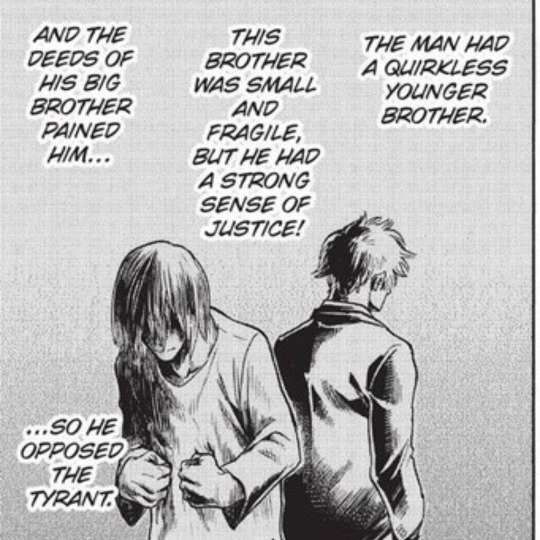
" The man had a quirkless little brother / the man had a quirkless younger brother.
The little brother was small, and frail, but he harbored a strong sense of justice...! / This brother was small and fragile, but he had a strong sense of justice!
His brother's actions panged his heart... and he opposed him / and the deeds of his big brother pained him... So he opposed the tyrant. "
( A quirkless little brother asking why the world is so unfair finding out he actually has a quirk when he decides to oppose his abuser? Of course, here the difference is that Yoichi was older than Tenko when it all happened. He was not a confused 5 years old trying to understand why and how.... )
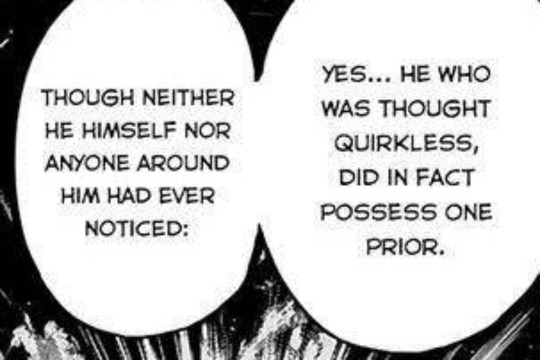

" Yes... He who was thought quirkless, did in fact possess one prior. / Yes... It turned out he hadn't actually been quirkless from the start.
Though neither he himself nor anyone around him had ever noticed / thought neither he nor anyone else has known it. "
That means there is a previous instance in which a young man thought quirkless had indeed a quirk: Yoichi himself!
It also makes me think about how Tomura/Tenko's control over decay depends on his emotional and psychological state.
The night his quirk awakened, we saw that Tenko had no control over it; everything that touched the ground he had contact with decayed. After he was "rescued" and after he was given the hands of his deceased family, AFO noticed that Tomura had unconsciously restrained decay so he would only affect the things he directly touched. Later on the story, Tomura was able to expand his quirk, evolving to decay without using all his five fingers during My Villain Academia. He was able to decay things at will during the War arc!!!
Could it be possible that Tenko had unconsciously repressed his own quirk for years before the night he killed his family?
Maybe when he tried to repress his own feelings about what was happening at home, Tenko also repressed decay without knowing. If he kept all his negative feelings in check as to not upset his family, it'd be an option.
If we wanted to reaaaally go crazy theorizing, we could even make a case about how Tenko having a previous quirk before AFO implanted decay on him is a possibility (within the frames of the bnha narrative). I'm not going there, but I think that fic authors would appreciate the prompt.
#bnha#mha#my hero academia#boku no hero academia#league of villains#lov#shigaraki tomura#yoichi shigaraki#ofa#one for all#all for one#afo#tenko shimura#bnha meta#mha meta#shan's bnha meta#Shan's mha meta
72 notes
·
View notes
Text
Having now read the official release of MHA 407, I don’t (yet) see the argument that AFO was a traumatized baby who was just looking for someone to respond to his cries and take care of him the way that Tenko was wandering the streets. While it’s revealed that AFO doesn’t want to be alone, AFO’s backstory and Tenko’s backstory reveal two very different men with different motivations.
The narrative in 407 says young AFO distrusts anyone who won’t turn and look at him when he cries because those people don’t offer anything of value to him. He can’t manipulate them into doing what he wants, and therefore they are useless and he can kill them if he wants. This has long been AFO’s thought pattern, and it’s what he taught young Tenko — YOU are more important than anything, and YOU should always act how you desire. Nothing in the world matters except what YOU want to do.
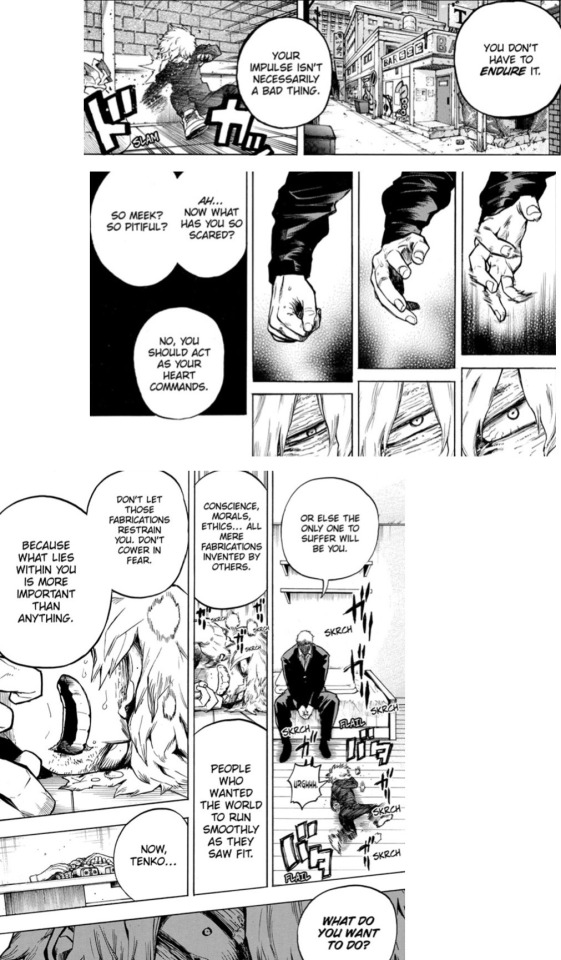
Contrast that with young Tenko’s initial reactions when realizing he killed his family, and with Tomura’s later hesitation to kill (or even attack) Katsuki after Katsuki refuses to join the LOV. Tenko/Tomura cares about other people, even after they refuse him, in a way that AFO does not.

Moreover, look at young AFO’s faces. He isn’t shown smiling or crying or having any emotion at all until page 11, when he reveals he killed the glowing child and stole their quirk. He then grins widely as he talks about his dream of a world that exists only for him. AFO didn’t smile when killing the anti-meta group OR when reading with Yoichi. He has no happy, smiling memories prior to this moment (even with Yoichi), unlike Tenko who had fond memories of his mom, sister, friends, and dog.
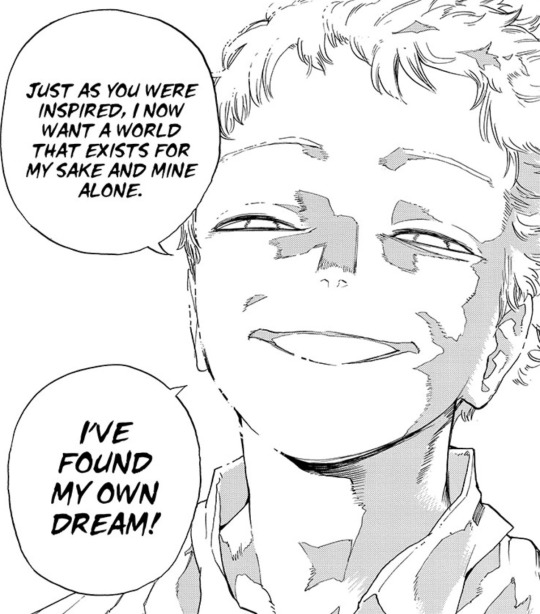
As another point of contrast, look at why AFO wants to be the villain: He wants to be surrounded by people who pay tribute to him. He does not want to “battle on in solitude.” (Another reason why AFO hated All Might for smashing his face in — it required a lengthy recovery hidden away from followers.)

To AFO, people are a one-way relationship. He doesn’t want to be alone, so he wants to possess a brother who directly opposes everything AFO stands for; a brother who is family and who wishes for the best but will never be a supporter, follower, ally, or friend. AFO gives Yoichi a quirk thinking that will change Yoichi’s mind, or keep him somehow bound to AFO.
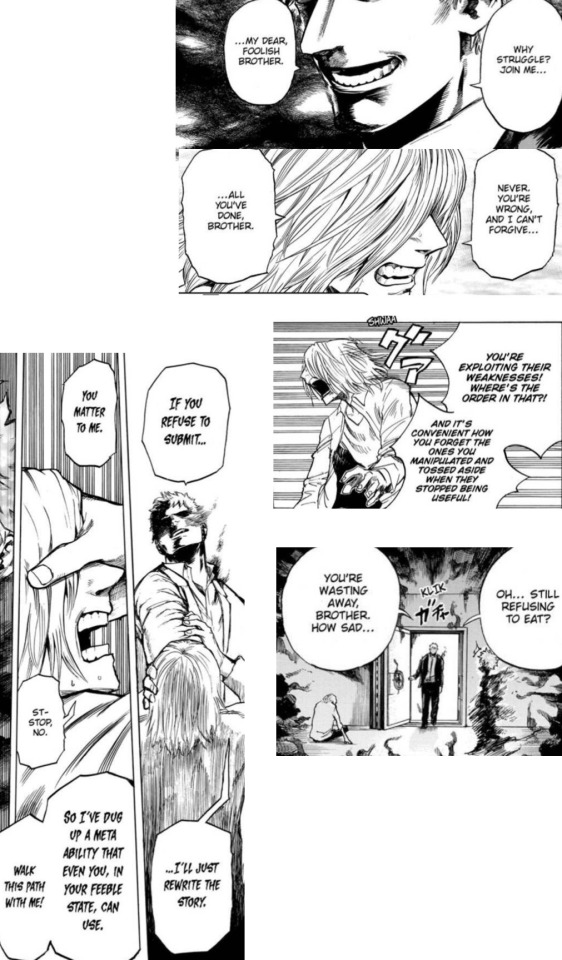

Tomura, however, wants allies, and in return he wants to give back to them. He got downright DEFENSIVE when Mirio said he didn’t have any friends. Tomura understands the give-and-take involved in working with people. He doesn’t just want followers that do his bidding.
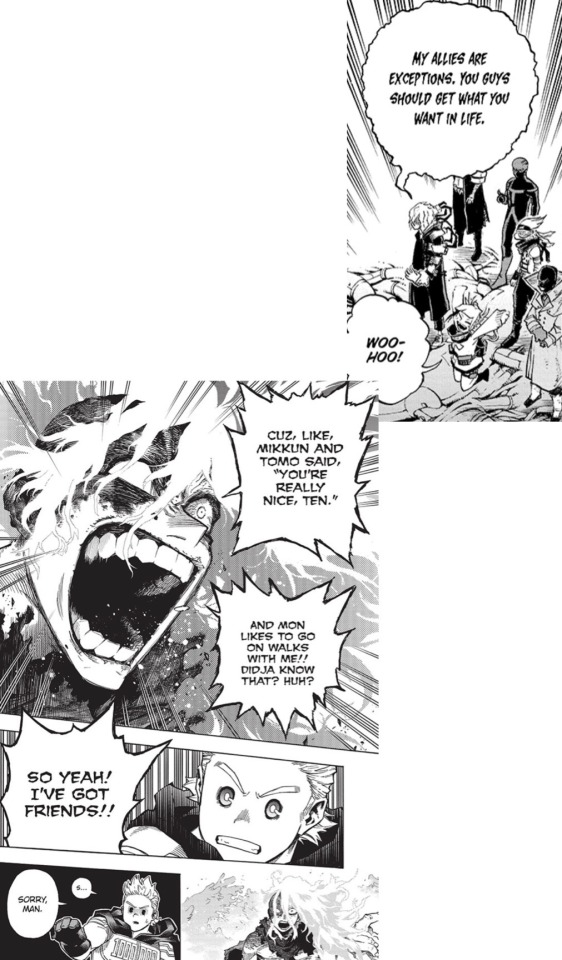
In the end, AFO’s unrelenting selfishness will leave him alone — at some point he will run out of “followers” and paths to victory. Meanwhile, Yoichi and Kudou built a network that ensured they would not be alone in their battle. They found true allies in the other OFA holders, and in turn Izuku found allies among pro heroes and at UA, just as Tomura did in the LOV. They are not alone.

#bnha 407#mha 407#bnha spoilers#mha spoilers#AFO#all for one#yoichi#mha yoichi#Kudou#mha kudou#2nd ofa user#second ofa user#tomura shigaraki#Tenko shimura#mha meta#bnha meta
328 notes
·
View notes